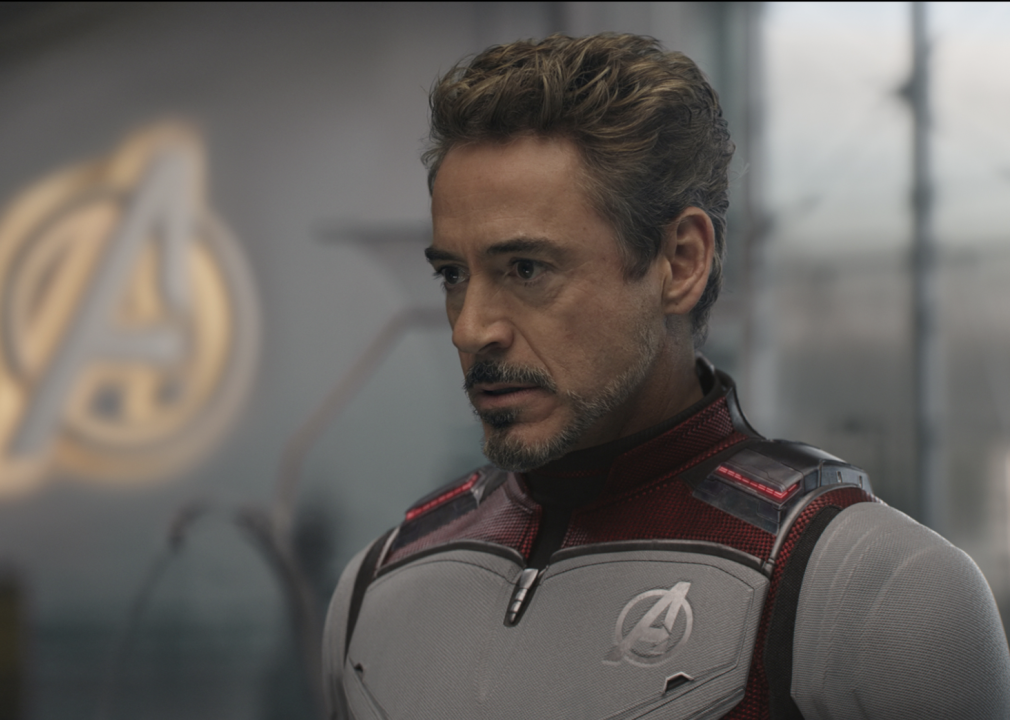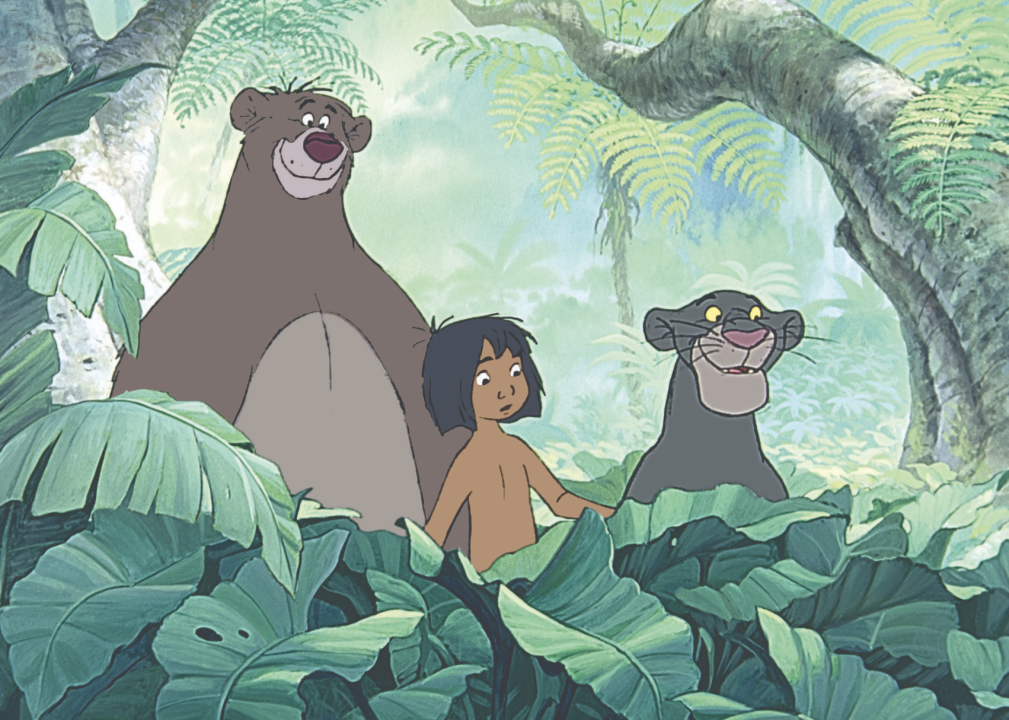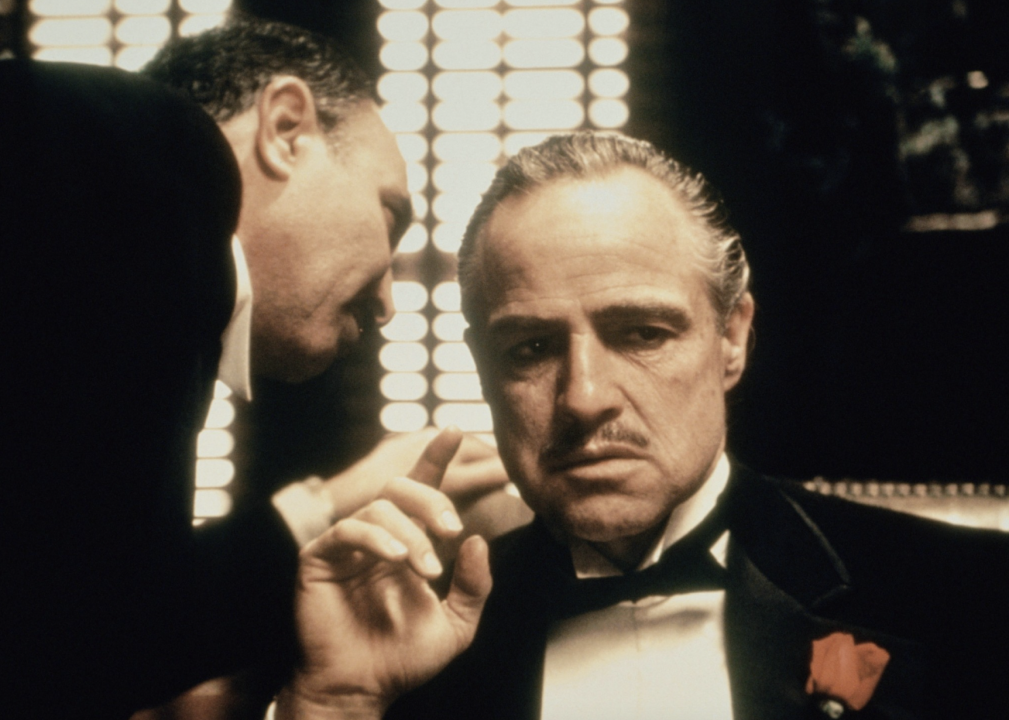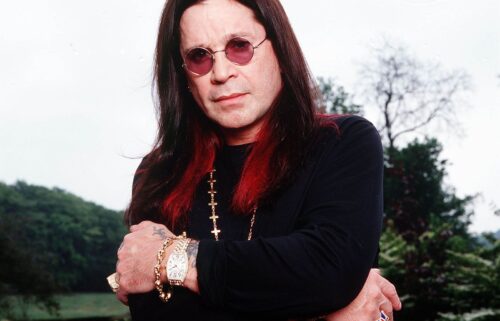Highest-grossing movie franchises
Disney/Marvel Studios
Highest-grossing movie franchises
Among the most anticipated movies every year are the inevitable sequels and prequels to favorite films, from “Star Wars” to “Ghostbusters.” With so many popular film universes enthusiastically expanding and growing, we decided to take a look at some old favorites to see which franchises are the highest-grossing of all time.
Movie studios continue to turn out blockbusters that are flashier and more technologically advanced than ever before, many now being pre-released on streaming platforms and in theaters. But how do the newest smash hits stand up to everyone’s old favorites? Stacker scoured The Numbers for film franchise data as of April 2022 and ranked them according to inflation-adjusted total domestic gross for all movies in their series. Franchises within franchises were not included, but franchises that had identities outside of a single franchise were included. For example, “Iron Man” is absorbed into the Marvel Cinematic Universe, but “Batman” and “Superman” have films outside of the DC Extended Universe that qualifies them to rank on their own.
Keep reading to discover which franchises are the highest-grossing in the United States.
You may also like: Actors with the most Golden Globe wins of all time
![]()
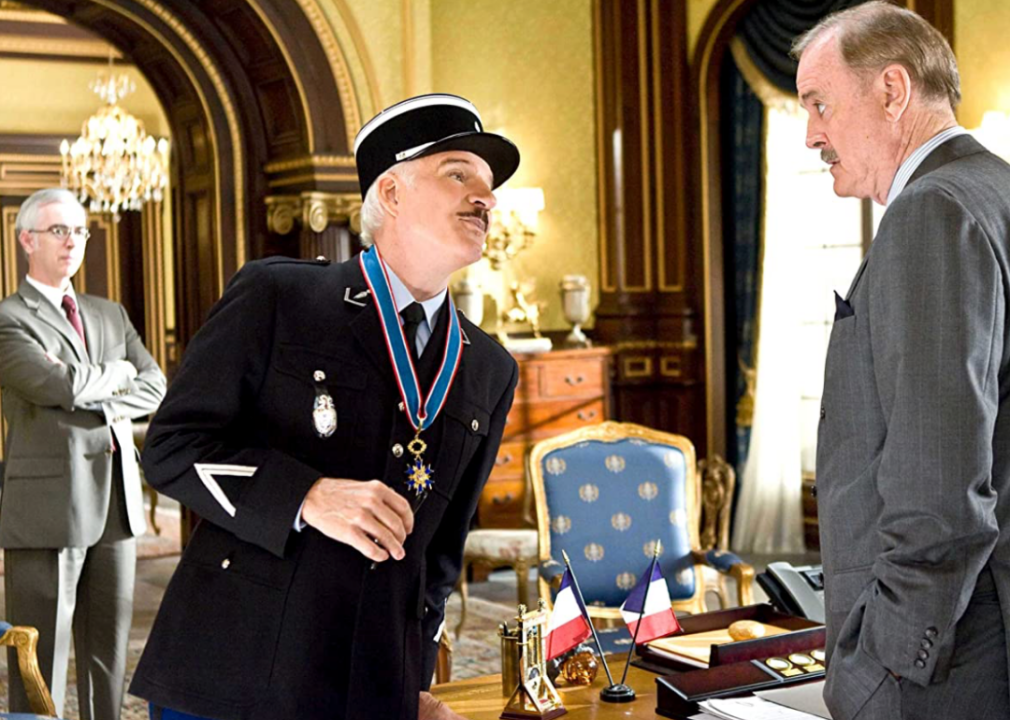
Metro-Goldwyn-Mayer (MGM)
#50. Pink Panther
– Domestic box office (inflation-adjusted): $904,886,843
– Worldwide box office (non-inflation-adjusted): $378,233,670
– Years: 1964-2009
One of the longest-running franchises on the list, Pink Panther began with an eponymous film starring Peter Sellers as Inspector Clouseau and finished with “The Pink Panther 2” starring Steve Martin as the bumbling detective. Each of the 11 movies follows the inept investigator as he attempts to solve a variety of crimes, which primarily involve stolen jewels and are laugh-out-loud funny. The live-action film series spawned the Pink Panther cartoons, which also ran for 11 seasons, and a real-life gang of jewel thieves.
Walt Disney Animation Studios
#49. Jungle Book
– Domestic box office (inflation-adjusted): $931,771,238
– Worldwide box office (non-inflation-adjusted): $281,767,202
– Years: 1967-2013
The original Jungle Book film was based on Rudyard Kipling’s 1894 book and was the last project Walt Disney oversaw before his death in 1966. The massive success of the film led to a 2003 animated sequel, “The Jungle Book 2,” as well as two live-action versions made in the ’90s, including the 2016 live-action CGI hybrid. In 2020, Disney+ added a note to the beginning of the original film on its platform, noting that it contained “negative depictions and/or mistreatment of people or cultures.”
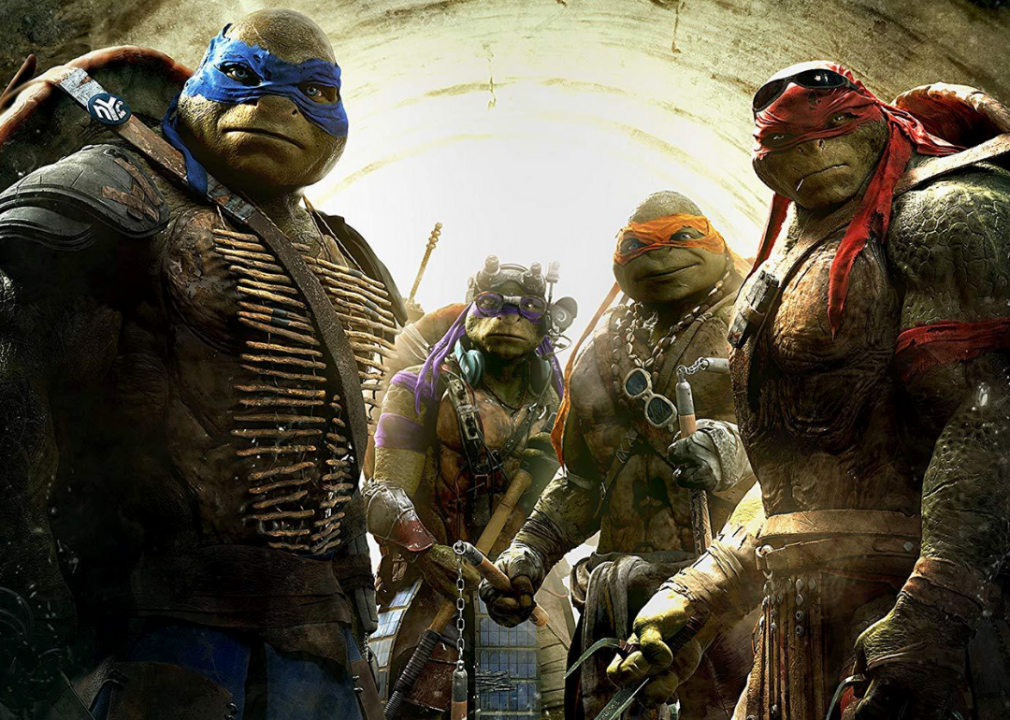
Paramount Pictures
#48. Teenage Mutant Ninja Turtles
– Domestic box office (inflation-adjusted): $932,656,804
– Worldwide box office (non-inflation-adjusted): $1,149,359,568
– Years: 1990-present
In 1990, four martial-arts-wielding turtles stepped out of the comics and onto the big screen. Despite actors having to wear 70-pound costumes and a major studio pulling out, the first film in this namesake series became the highest-grossing independent film of its time. Three additional films followed before Michael Bay rebooted the series in 2014. The reboot was a success as well—turtle power, indeed.
Paramount Pictures
#47. Godfather
– Domestic box office (inflation-adjusted): $942,740,914
– Worldwide box office (non-inflation-adjusted): $394,089,165
– Years: 1972-1990
Francis Ford Copolla’s iconic mobster trilogy was nominated for a historic 28 Academy Awards, winning nine. The first two films are ranked #2 and #32 on the American Film Institute’s list of 100 Greatest American Films of All Time. In 2020, the third installment was rereleased under the name “Mario Puzo’s The Godfather, Coda: The Death of Michael Corleone,” and included a different beginning and ending.
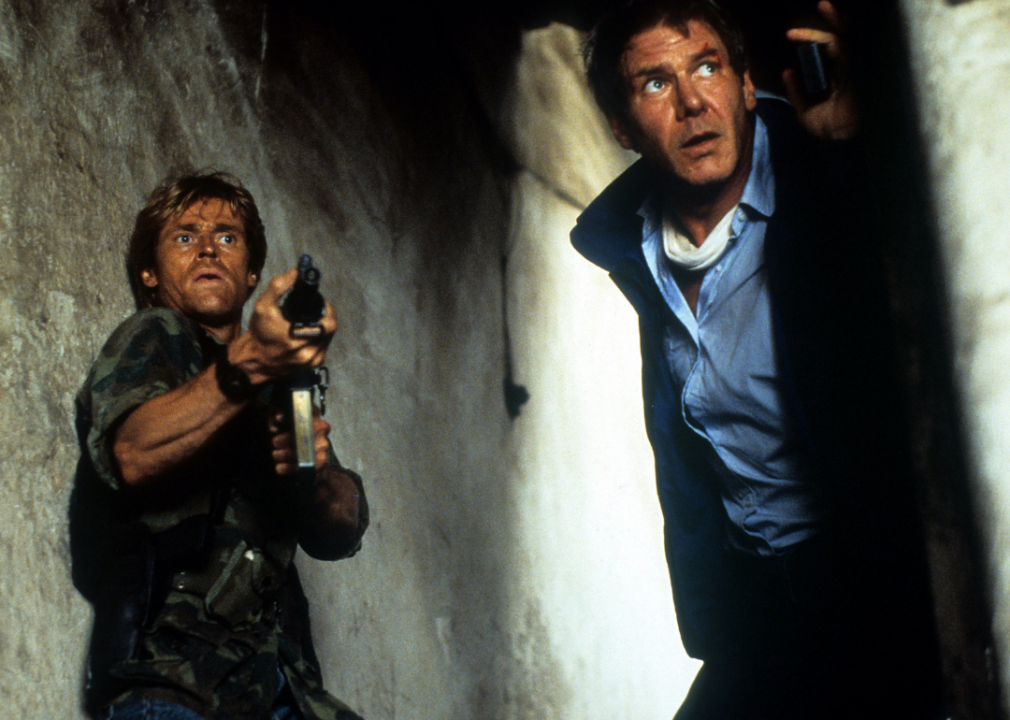
Paramount Pictures // Getty Images
#46. Jack Ryan
– Domestic box office (inflation-adjusted): $964,307,662
– Worldwide box office (non-inflation-adjusted): $910,977,412
– Years: 1990-2014
The character of Jack Ryan, a marine turned CIA operative turned president, made his first appearance in the Tom Clancy novel, “The Hunt for Red October.” Similar to James Bond, there have been several well-known actors who have portrayed the man over the course of the films and an Amazon TV series, including Alec Baldwin, Harrison Ford, Ben Affleck, Chris Pine, and John Krasinski. Movies in the series include “The Hunt for Red October,” “Patriot Games,” “Clear and Present Danger,” “The Sum of All Fears,” and “Jack Ryan: Shadow Recruit.”
You may also like: Movie trivia for the top 100 films of all time
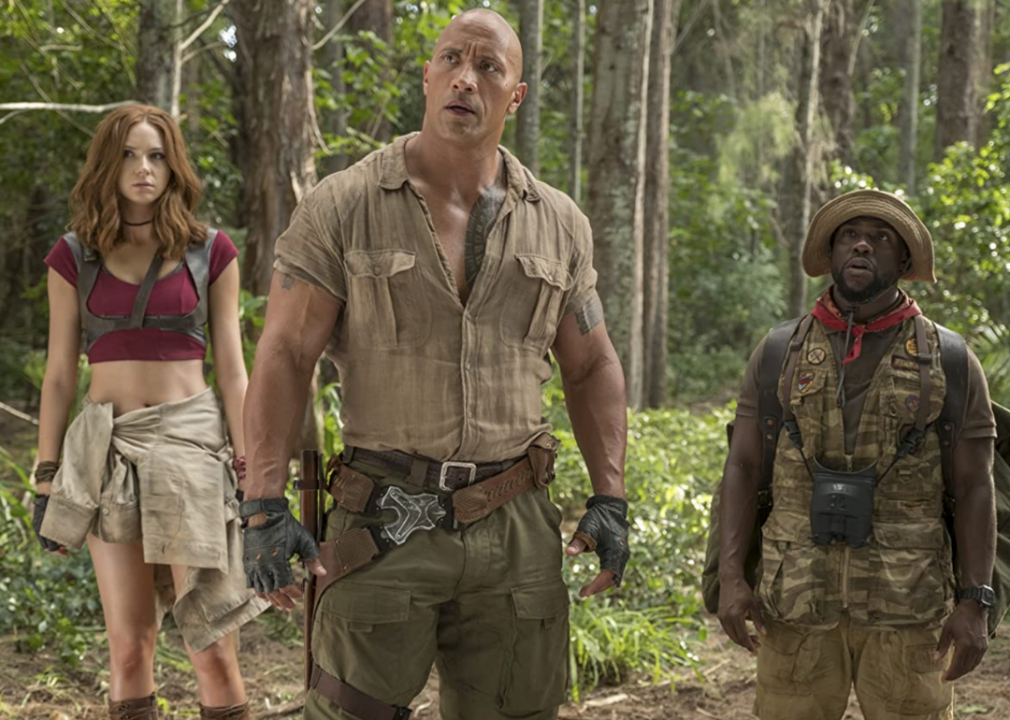
Sony Pictures Entertainment Inc.
#45. Jumanji
– Domestic box office (inflation-adjusted): $977,338,618
– Worldwide box office (non-inflation-adjusted): $2,081,249,949
– Years: 1995-2019
If this list proves anything, it’s that reviving a franchise that has been dormant for years is not often done easily—or well. However, this was not the case for “Jumanji.” The world of the 1995 film was brought back to life on the big screen in 2017 with an all-star cast including Duane Johnson, Kevin Hart, Jack Black, and Karen Gillan. The movie grossed more than $900 million and set the stage for many more Jumanji films to come.
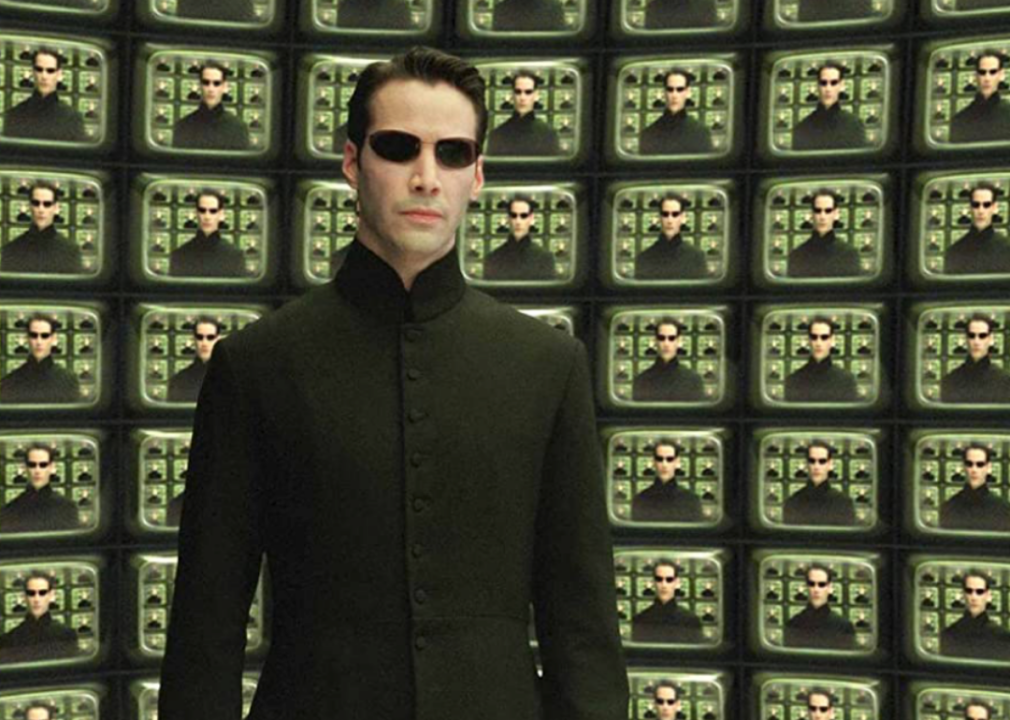
Warner Bros.
#44. The Matrix
– Domestic box office (inflation-adjusted): $986,971,220
– Worldwide box office (non-inflation-adjusted): $1,788,319,204
– Years: 1999-2021
When the first Matrix film made its debut in 1999 it was hailed a “revolution in filmmaking” and quickly became the highest-grossing rated-R movie up to that point. Unfortunately, the cyberpunk series, about the imprisonment of humanity in a virtual reality system by artificial intelligence, didn’t manage to keep the same steam in its sequels, which are generally considered far inferior. The same misfortune also befell the fourth installment, 2021’s “Matrix Resurrections,” which bombed at the box office, having globally grossed a mere $156 million against its $190 million budget.
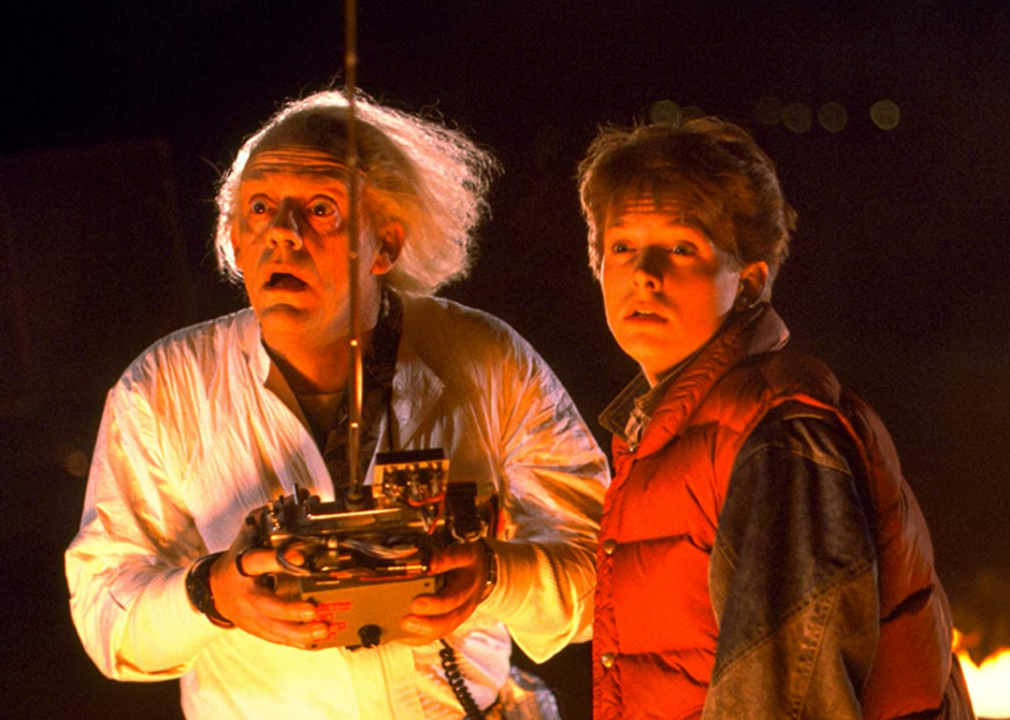
Universal Pictures
#43. Back to the Future
– Domestic box office (inflation-adjusted): $991,113,802
– Worldwide box office (non-inflation-adjusted): $961,569,354
– Years: 1985-1990
Back to the Future is one of those rare franchises where all the movies are considered to be equally well-made (even if there’s a diminishing return on the inside nods to earlier installments). Approval ratings for the films, which follow a high school student named Marty McFly who travels through time in a DeLorean time machine, lie between 80-96% on Rotten Tomatoes. Produced by Steven Spielberg’s company, Amblin Entertainment, all three films star Michael J. Fox and Christopher Lloyd.
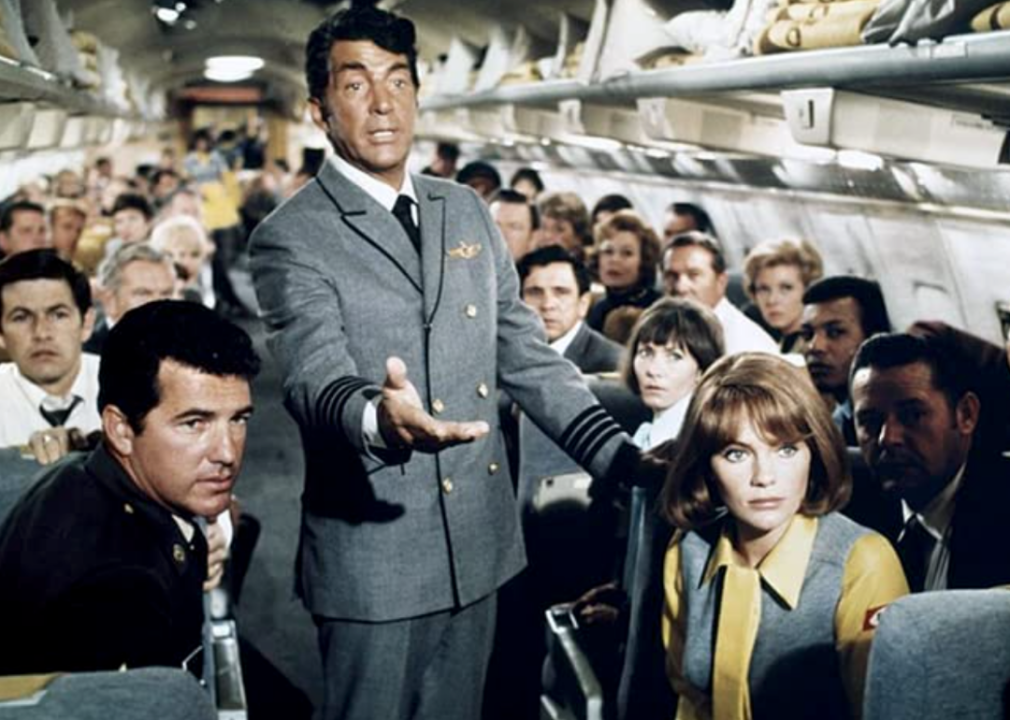
Ross Hunter Productions
#42. Airport
– Domestic box office (inflation-adjusted): $997,238,252
– Worldwide box office (non-inflation-adjusted): $190,774,302
– Years: 1970-1979
The Airport franchise may be one of the highest-grossing movie franchises of all time, but that doesn’t mean that it’s actually any good. The first film was nominated for 10 Academy Awards, but Burt Lancaster, one of its stars, called it a piece of junk, and the New York Times compared it to a 137-minute television commercial. The series only went downhill in quality after that, rendering the final few movies almost unwatchable.
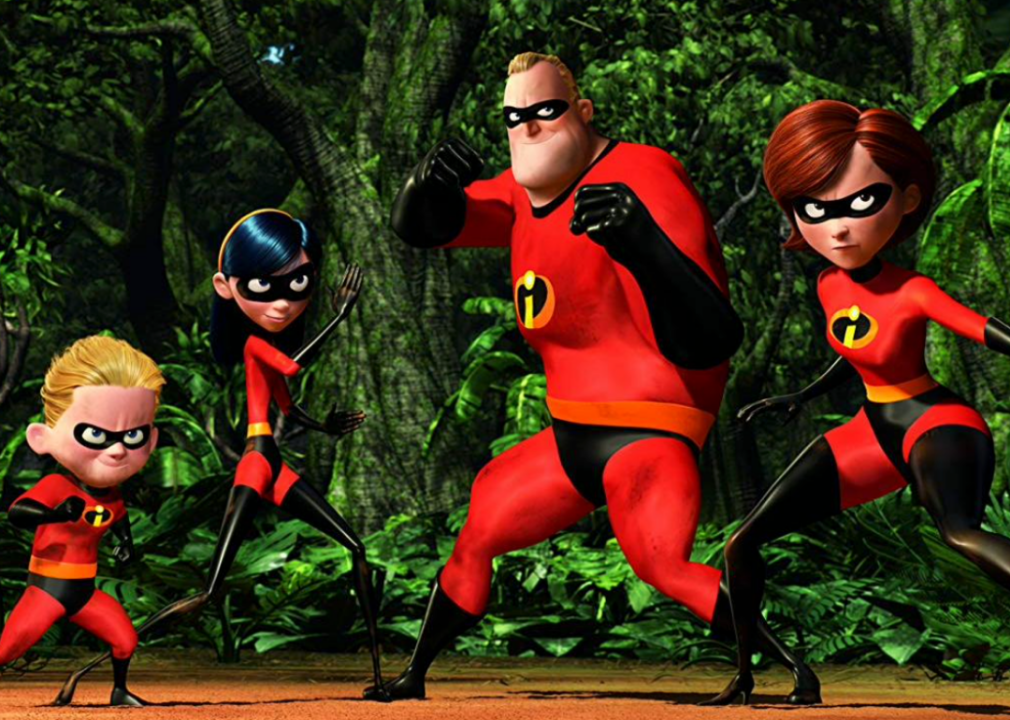
Walt Disney Pictures
#41. The Incredibles
– Domestic box office (inflation-adjusted): $998,196,306
– Worldwide box office (non-inflation-adjusted): $1,874,246,451
– Years: 2004-2018
The 3D animated action-adventure film series explores the nature of family and how work can often define people. Voice-over talent for the movie characters include stars Craig T. Nelson, Holly Hunter, Sarah Vowell, and Samuel L. Jackson. “The Incredibles” hit the box office with a bang and won two Academy Awards for Best Animated Feature and Best Sound Editing. The “Incredibles 2” surpassed its predecessor’s box office success, grossing $584 million, and pulled in favorable reviews.
You may also like: Mistakes from the 50 best movies of all time
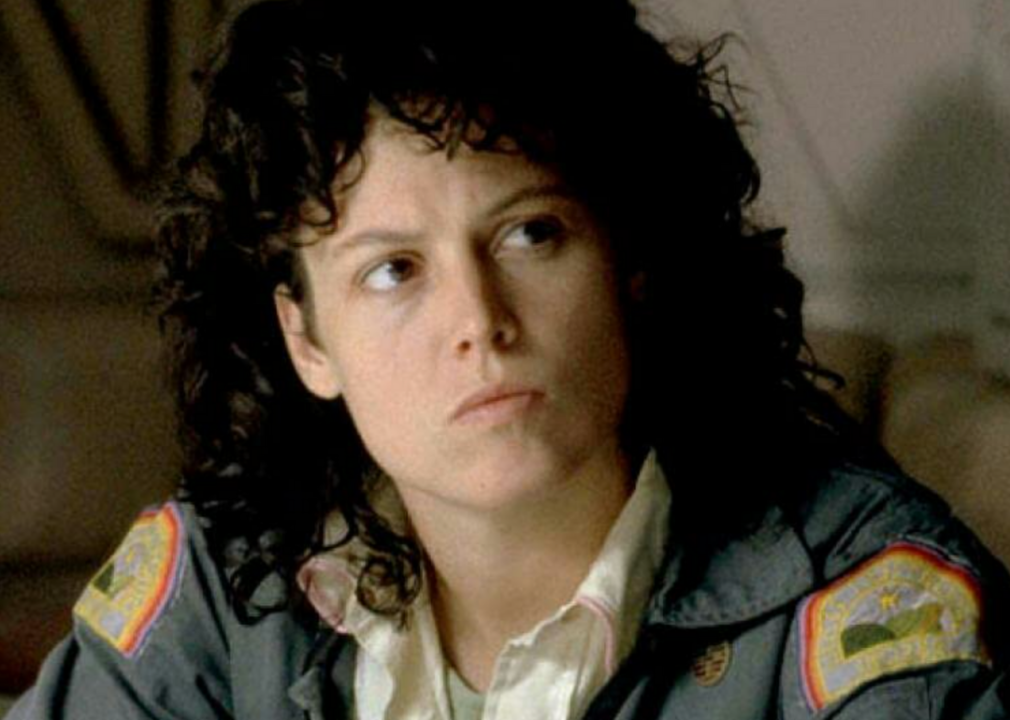
Twentieth Century Fox
#40. Alien
– Domestic box office (inflation-adjusted): $1,045,026,928
– Worldwide box office (non-inflation-adjusted): $1,629,593,281
– Years: 1979-2017
The sci-fi horror franchise centers around four core movies starring Sigourney Weaver—1979’s “Alien,” 1986’s “Aliens,” 1992’s “Alien 3,” and 1997’s “Alien Resurrection.” The original budget for “Alien” was $4.2 million, which 20th Century Fox doubled to $8.4 million after seeing director Ridley Scott’s storyboards. The original series built such a cult following over the years that it spawned a prequel series in 2014, earning it a place on the list.
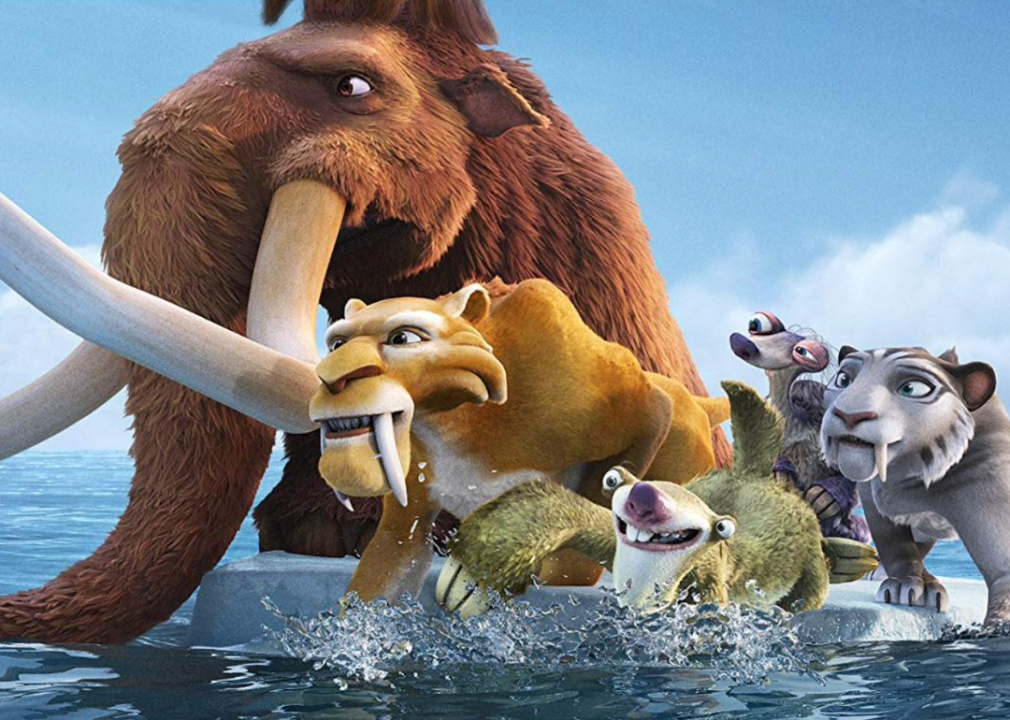
Twentieth Century Fox
#39. Ice Age
– Domestic box office (inflation-adjusted): $1,045,957,280
– Worldwide box office (non-inflation-adjusted): $3,206,624,261
– Years: 2002-present
The animated action-adventure comedy about a group of animals set in the Pleistocene era features the voices of well-known stars such as Denis Leary, John Leguizamo, and Ray Romano. Despite the scientific inaccuracies of the films, they have grossed $6 billion at the box office and retail sales, making Ice Age one of the highest-grossing media franchises of all time.
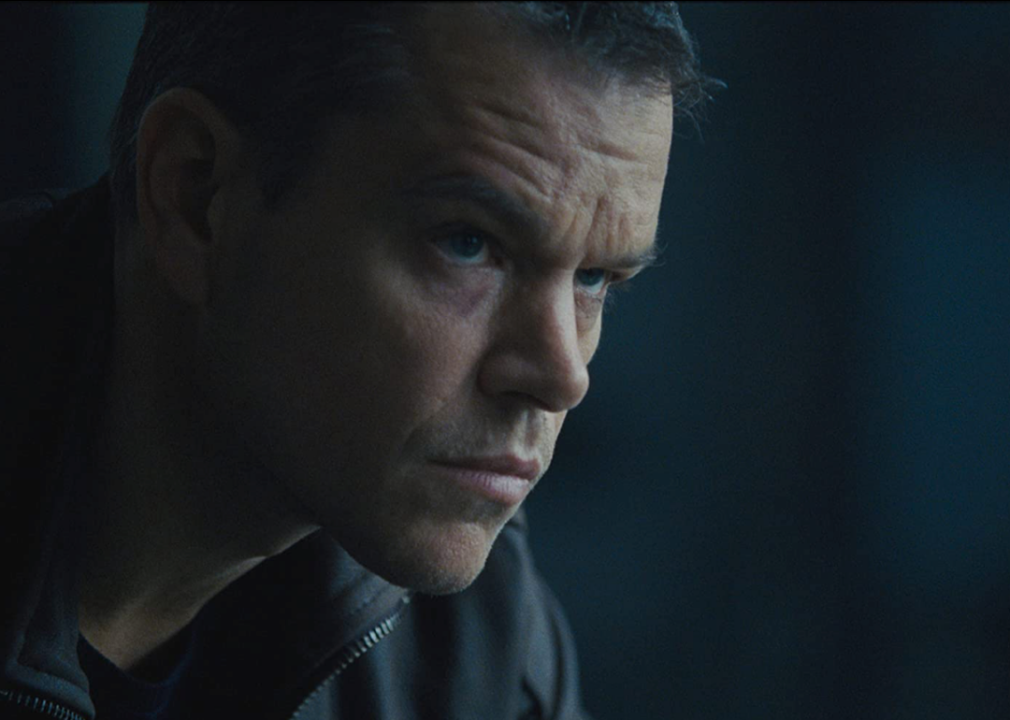
Universal Pictures
#38. Bourne
– Domestic box office (inflation-adjusted): $1,057,275,460
– Worldwide box office (non-inflation-adjusted): $1,665,926,127
– Years: 2002-2016
Matt Damon is now synonymous with Jason Bourne, the titular focal point of the action-spy thriller franchise of the same name. The films are based on a trilogy of novels by Robert Ludlum. The franchise’s most successful film, “The Bourne Ultimatum,” won Oscars for Best Film Editing, Best Sound Mixing, and Best Sound Editing.
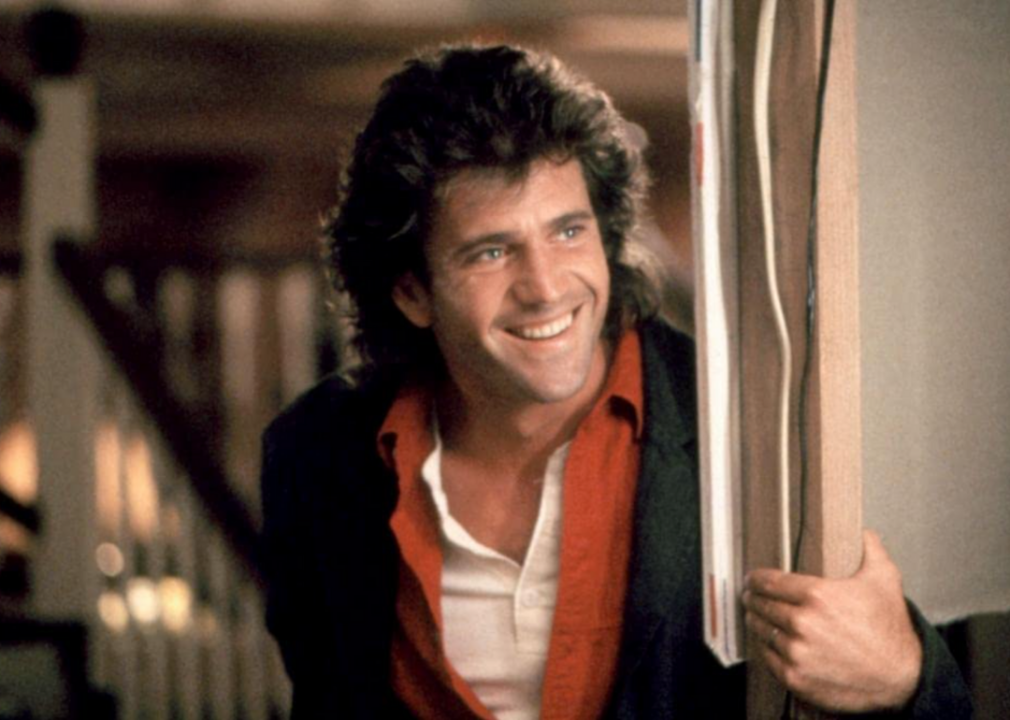
Warner Bros.
#37. Lethal Weapon
– Domestic box office (inflation-adjusted): $1,066,172,140
– Worldwide box office (non-inflation-adjusted): $952,592,350
– Years: 1987-1998
One of the most classic action franchises to come out of the 1980s, the Lethal Weapon movies follow two Los Angeles Police Department detectives (Danny Glover and Mel Gibson) as they work to take down leaders in the city’s violent underworld. The first two movies were wildly successful with critics and audiences, while the second two fared substantially worse. The production of a reported fifth movie in the series, which would be the last, is still up in the air.
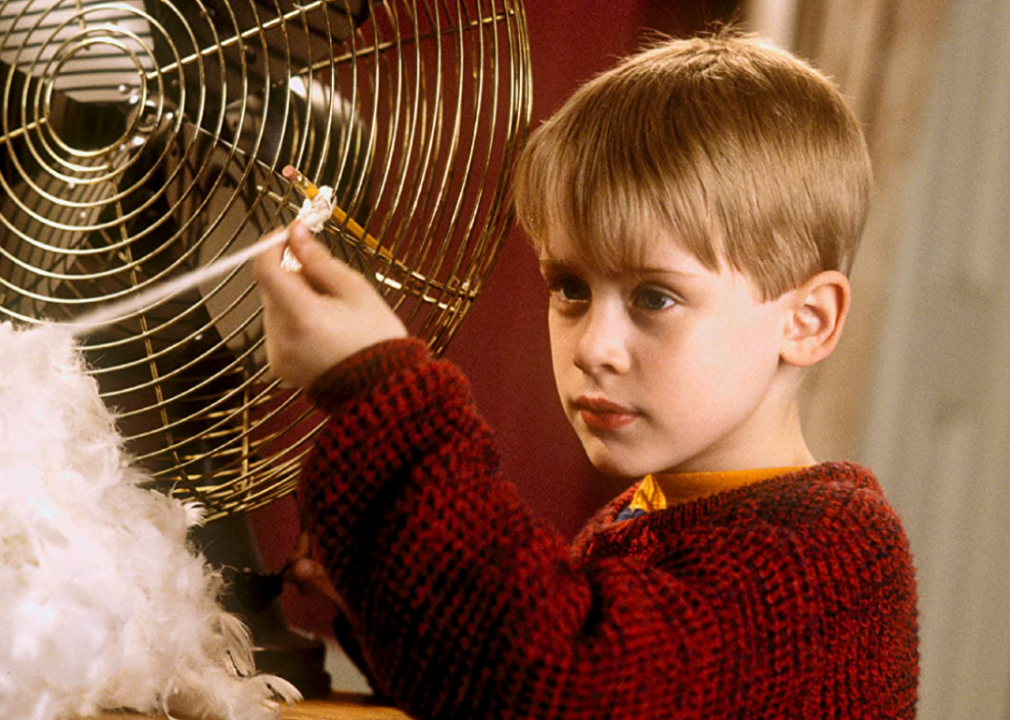
20th Century Fox
#36. Home Alone
– Domestic box office (inflation-adjusted): $1,066,251,782
– Worldwide box office (non-inflation-adjusted): $866,370,830
– Years: 1990-2021
Even the most die-hard Home Alone film fans might be surprised to find that there are five movies in this franchise. The first two, starring Macaulay Culkin, are the most famous. John Hughes directed and produced the first three.
You may also like: Top 100 thrillers of all time, according to critics
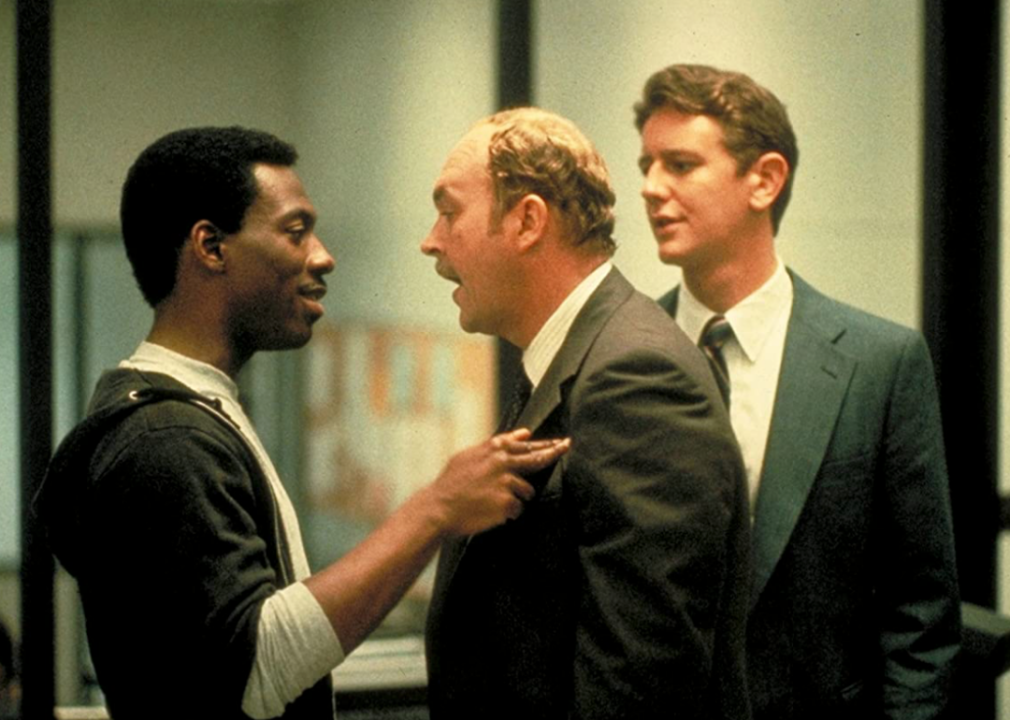
Paramount Pictures
#35. Beverly Hills Cop
– Domestic box office (inflation-adjusted): $1,077,683,847
– Worldwide box office (non-inflation-adjusted): $712,145,974
– Years: 1984-2011
The Beverly Hills Cop franchise stars Eddy Murphy as a Detroit cop who solves crimes in Los Angeles alongside several other detectives and police agents. The first film in the series was hands down the most successful and has been credited with reviving the buddy-cop genre. While neither follow-up ever found the same success, fans are still holding out hope that the upcoming fourth installment, a Netflix production, will restore the franchise to its former glory.
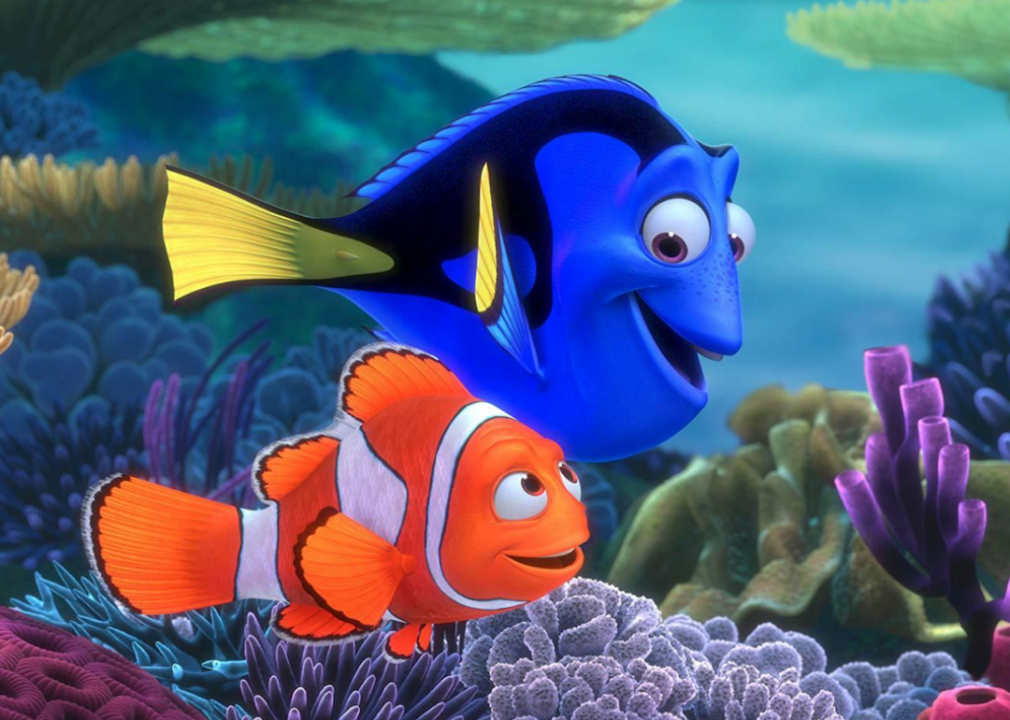
Walt Disney Pictures
#34. Finding Nemo
– Domestic box office (inflation-adjusted): $1,079,162,051
– Worldwide box office (non-inflation-adjusted): $1,961,100,977
– Years: 2003-2016
The Disney animated films “Finding Nemo,” released in 2003, and 2016’s “Finding Dory,” are two of the highest-grossing films of all time, amassing a lifetime gross in excess of $940 million and $1 billion, respectively. Much of their success is due to the fact that the plot of both films appeals to both children and adults.
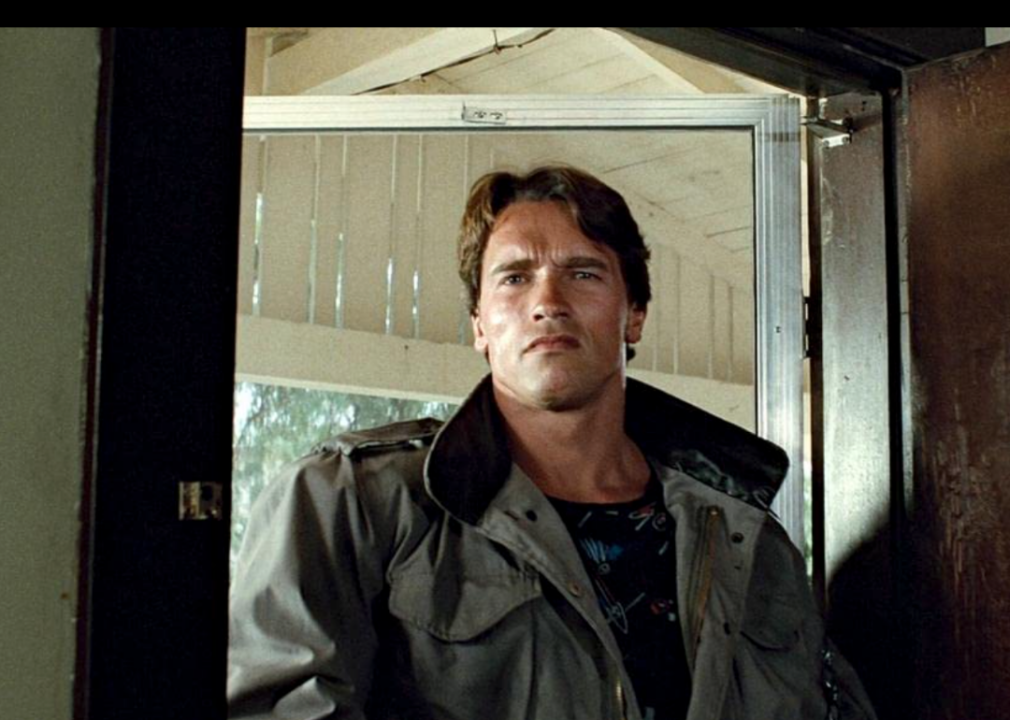
Cinema ’84
#33. Terminator
– Domestic box office (inflation-adjusted): $1,086,639,819
– Worldwide box office (non-inflation-adjusted): $2,074,483,263
– Years: 1984-2019
The sci-fi franchise solidified Arnold Schwarzenegger as a bona fide Hollywood action hero in his role as the titular Terminator in four of the five movies in the franchise. Schwarzenegger also appeared in “Terminator: Dark Fate,” the sixth and most likely final film in the franchise, which hit theaters in 2019.
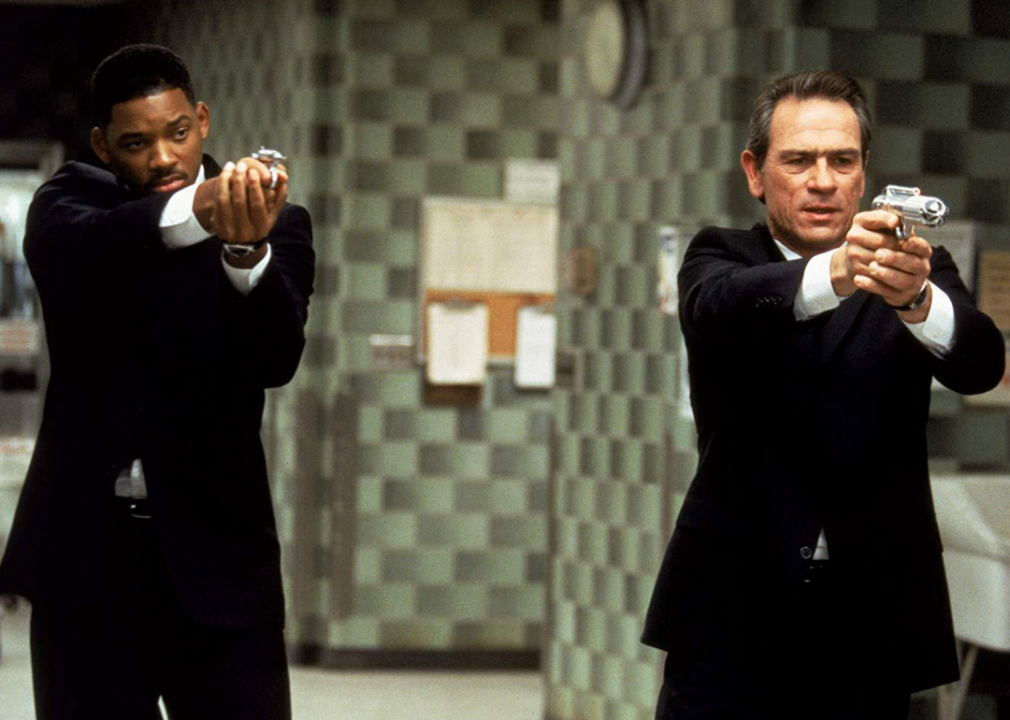
Columbia Pictures Corporation
#32. Men in Black
– Domestic box office (inflation-adjusted): $1,094,092,187
– Worldwide box office (non-inflation-adjusted): $1,940,844,428
– Years: 1997-present
The sci-fi buddy comedy series was based on a comic book of the same name by Lowell Cunningham. It stars Will Smith and Tommy Lee Jones as covert agents tasked with overseeing the alien population in New York City. Smith also wrote the “Men in Black” theme song, which went on to sell more than 3 million copies. The fourth film in the franchise, “Men in Black: International,” arrived in theaters in 2019.
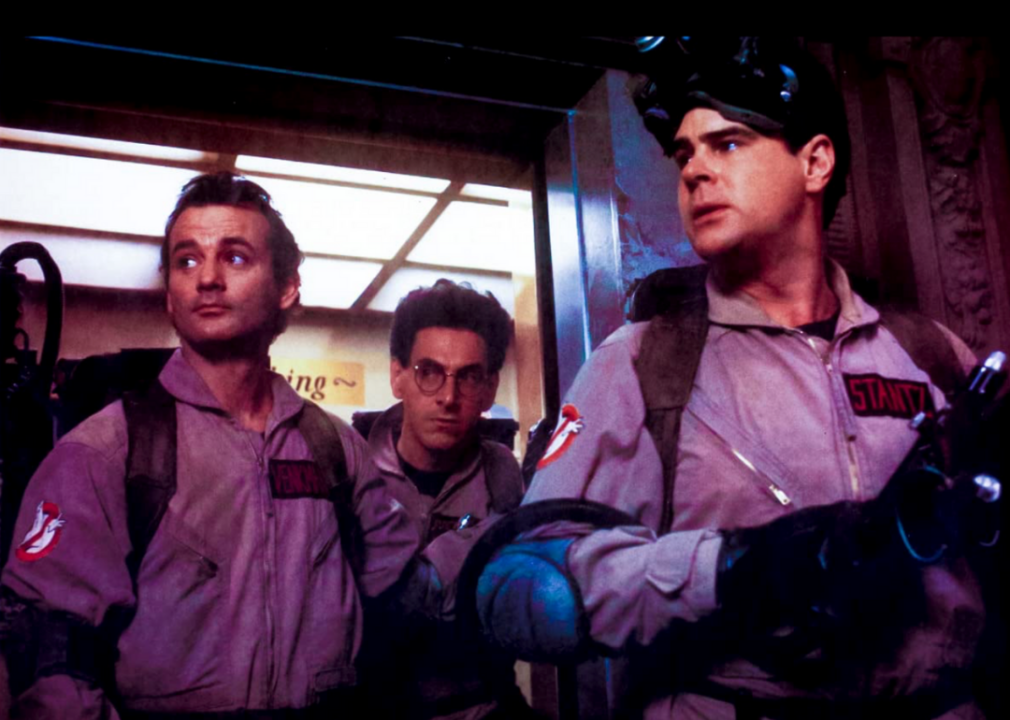
Columbia Pictures
#31. Ghostbusters
– Domestic box office (inflation-adjusted): $1,152,591,586
– Worldwide box office (non-inflation-adjusted): $944,251,367
– Years: 1984-present
Bill Murray, Dan Aykroyd, Sigourney Weaver, and Rick Moranis all starred in the first installations of the Ghostbusters franchise, which saw a group of scientists battling the supernatural. The comedy-action series was revived in 2016 with an all-female cast, much to the chagrin of some audiences. In response to the criticism, the studio announced a new installment, due out in late 2021, that will go back to the original universe and include much of the original cast.
You may also like: Oscar Best Actress winner from the year you were born

Walt Disney Pictures
#30. Mary Poppins
– Domestic box office (inflation-adjusted): $1,181,334,227
– Worldwide box office (non-inflation-adjusted): $451,197,486
– Years: 1964-2018
When the second installment in the Mary Poppins franchise hit theaters in 2018, it set a record for the largest gap between live-action franchise installments, premiering 54 years after the original. Both movies about a magical nanny and her charges are based on eight P.L. Travers books.
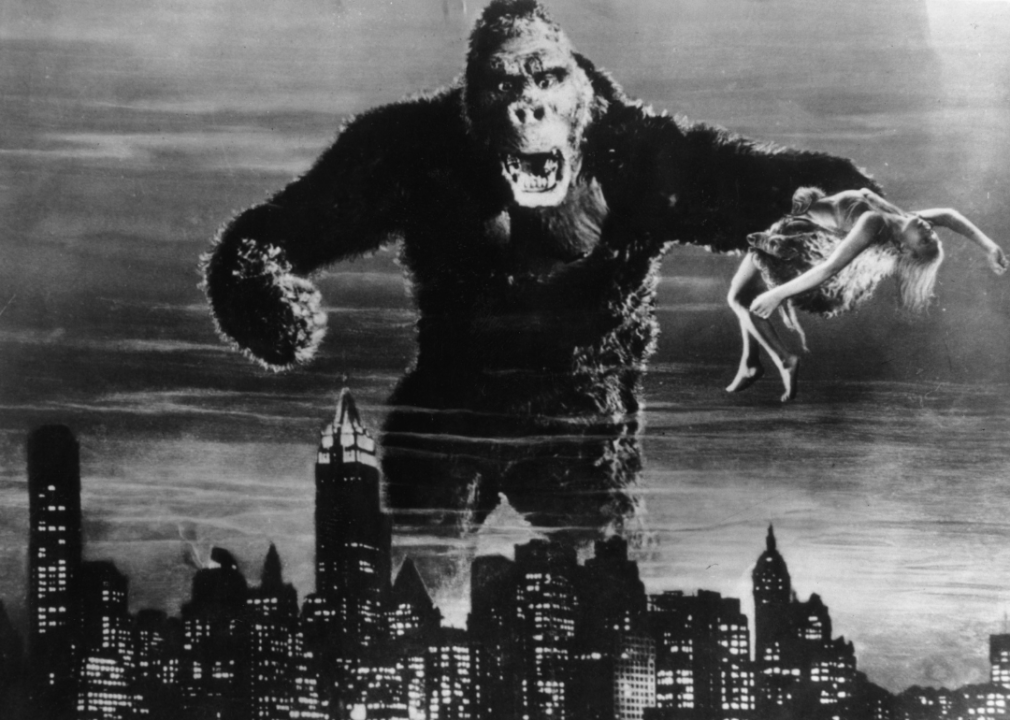
Hulton Archive // Getty Images
#29. King Kong
– Domestic box office (inflation-adjusted): $1,219,596,455
– Worldwide box office (non-inflation-adjusted): $1,684,981,491
– Years: 1933-2021
The King Kong franchise is a tough one to nail down, as the character has been owned by and licensed to many different studios throughout the years, and has appeared as a side character in dozens of other properties. Originally dreamed up in 1933 by producer Merian C. Cooper, King Kong has been brought to life with varying degrees of success and in various temperaments, throughout the six films included in this roundup. Regardless of the success of each of the various iterations of the giant ape, King Kong remains one of Hollywood’s largest, and most influential, faces.
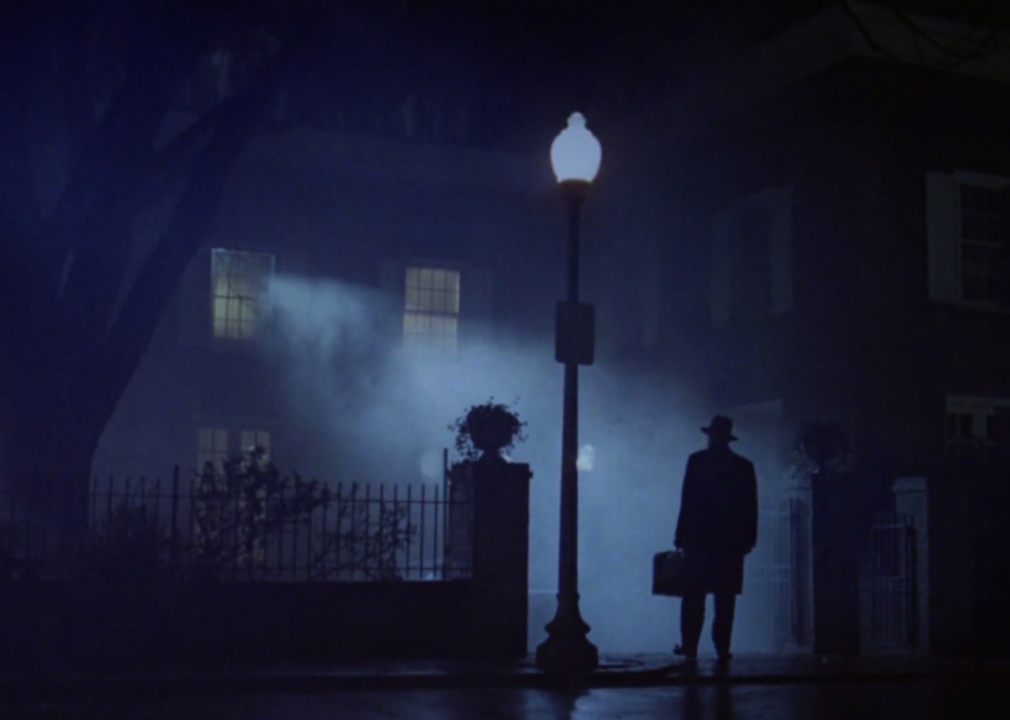
Warner Bros.
#28. Exorcist
– Domestic box office (inflation-adjusted): $1,282,608,679
– Worldwide box office (non-inflation-adjusted): $522,446,253
– Years: 1973-present
As with many other franchises, the Exorcist franchise films peaked with the release of the original, and it’s been all downhill since. The horror movies—which all feature some kind of demon possession—have included sequels and prequels and even spawned a short-lived TV series.
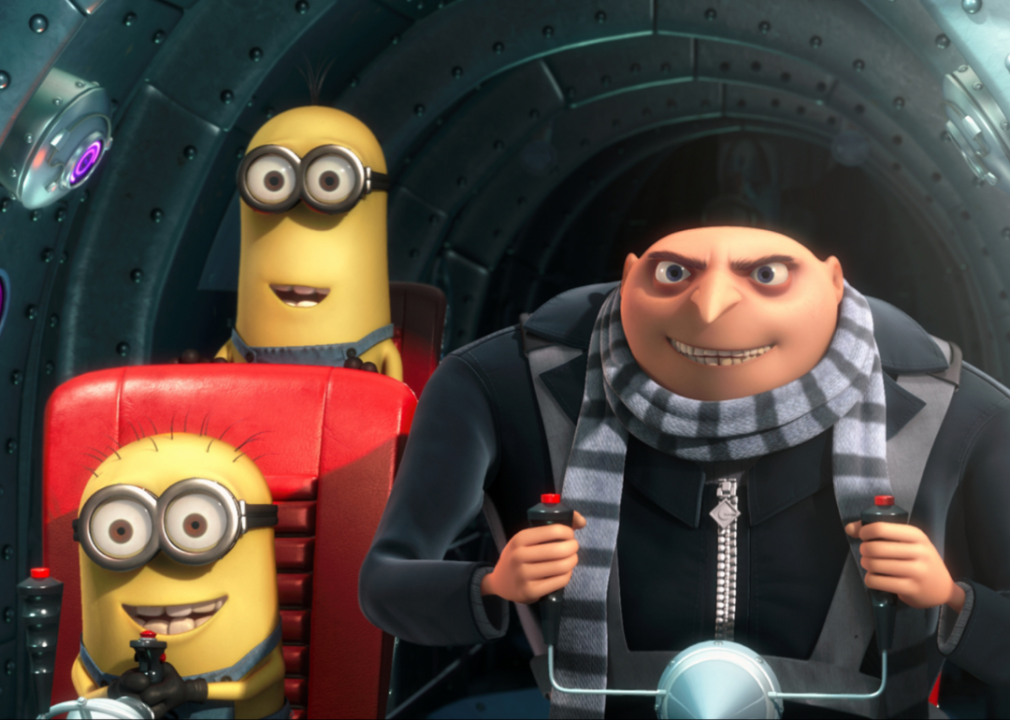
Universal Pictures
#27. Despicable Me
– Domestic box office (inflation-adjusted): $1,343,532,564
– Worldwide box office (non-inflation-adjusted): $3,711,274,535
– Years: 2010-present
The animated comedy franchise focuses on Gru and his yellow-colored Minions, which also became a spin-off of the series. 2022 will see the release of the sixth film in the series, “Minions: The Rise of Gru.”
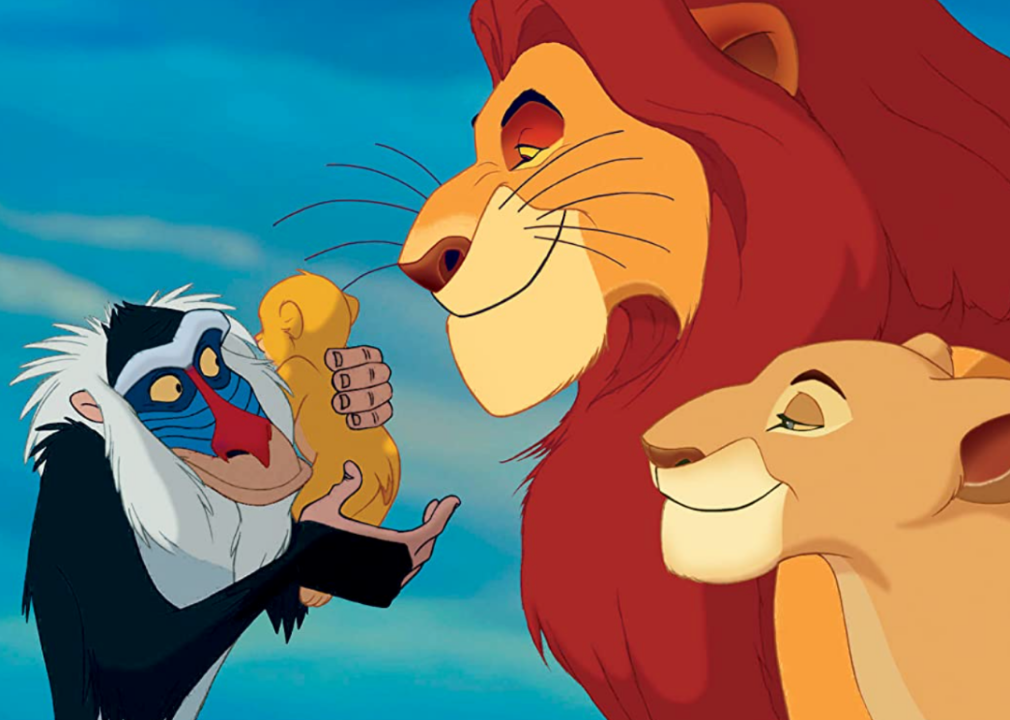
Disney Enterprises, Inc.
#26. The Lion King
– Domestic box office (inflation-adjusted): $1,377,232,323
– Worldwide box office (non-inflation-adjusted): $2,640,582,293
– Years: 1994-2019
Opening with what was, at one point, the highest-earning animated film of all time, “The Lion King” broke records for being the biggest stage and screen franchise to ever exist at the time, pulling in more than $11.6 billion at its combined box offices. That doesn’t mean, however, that every entry in the series is a winner—direct-to-video sequels like “The Lion King II: Simba’s Pride” didn’t fare well with critics or audiences. The 2019 live-action remake with voiceover work provided by Beyoncé and Donald Glover, on the other hand, was celebrated for its incredible visual effects.
You may also like: Best and worst Leonardo DiCaprio movies
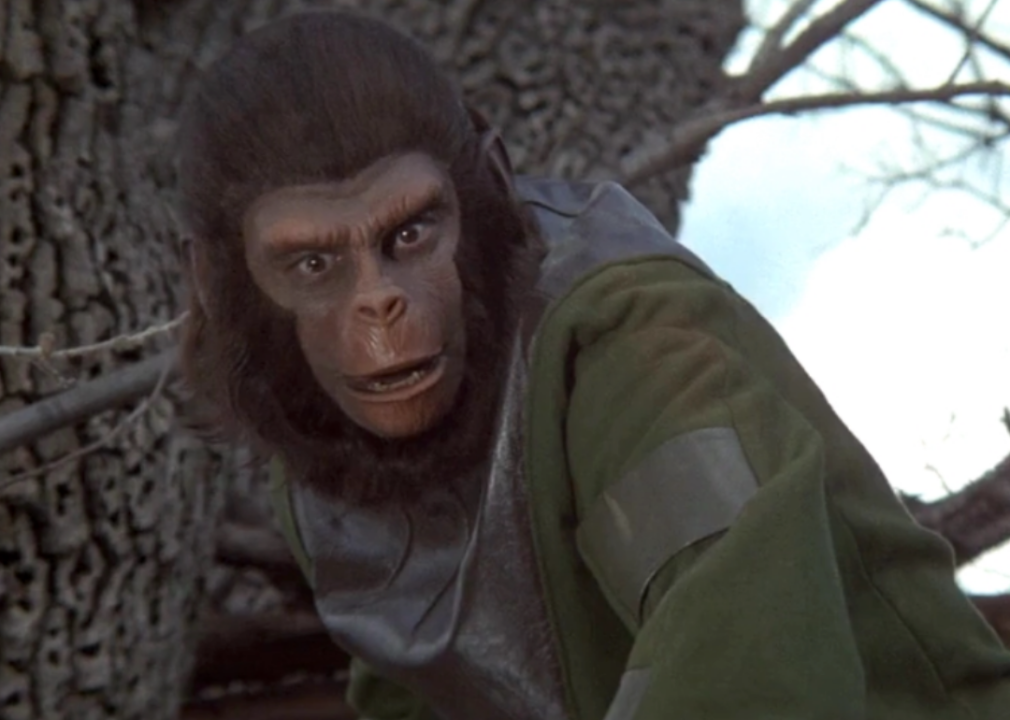
20th Century Fox
#25. Planet of the Apes
– Domestic box office (inflation-adjusted): $1,383,770,909
– Worldwide box office (non-inflation-adjusted): $2,115,122,718
– Years: 1968-2017
The Planet of the Apes franchise of nine movies spans nearly 50 years and also includes books. The movies are based on French author Pierre Boulle’s 1963 novel of the same name, comics, and a revision series. The franchise’s highest-grossing movie, 2014’s “Dawn of the Planet of the Apes,” features a star-studded cast and earned an Oscar nomination for Best Visual Effects.
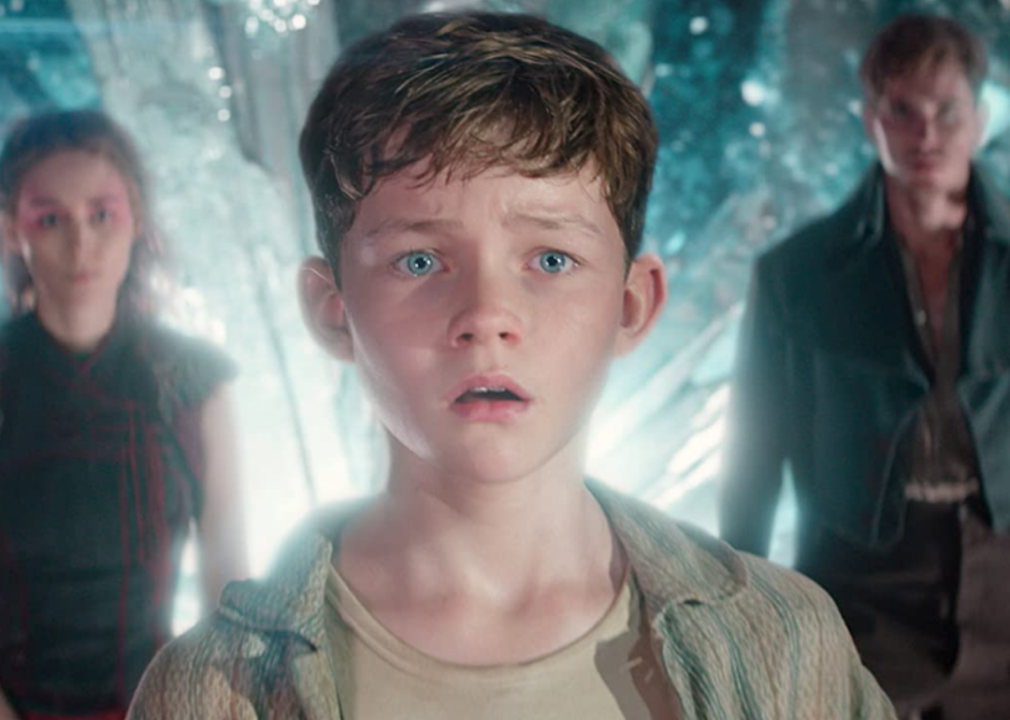
Warner Bros.
#24. Peter Pan
– Domestic box office (inflation-adjusted): $1,477,575,195
– Worldwide box office (non-inflation-adjusted): $708,714,979
– Years: 1953-present
Beginning with Walt Disney’s animated 1953 classic, the Peter Pan franchise has spanned a number of decades, as well as several mediums including animated movies, live-action films, stage productions, and novels. The original film was by far the most popular, earning more than $87 million at the box office, but Disney seems to be holding out hope that new additions could be just as major. In 2020, the studio announced a new franchise addition, the live-action “Peter Pan & Wendy,” slated for a 2022 release.
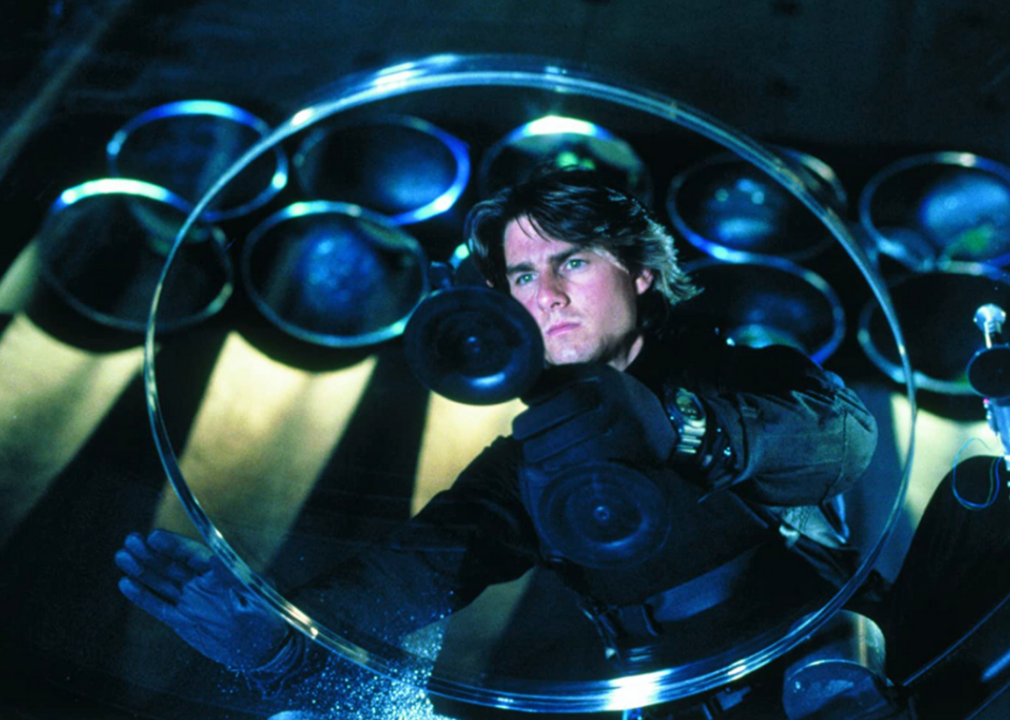
Paramount Pictures
#23. Mission: Impossible
– Domestic box office (inflation-adjusted): $1,604,470,875
– Worldwide box office (non-inflation-adjusted): $3,577,423,206
– Years: 1996-present
The American action-adventure series stars Tom Cruise as Ethan Hunt, the protagonist of the series. The sixth and most recent film, “Mission Impossible: Fallout,” was released in July 2018 and brought in more than $61 million during its first weekend in theaters. There are two more films scheduled to be released, in 2021 and 2022, respectively.
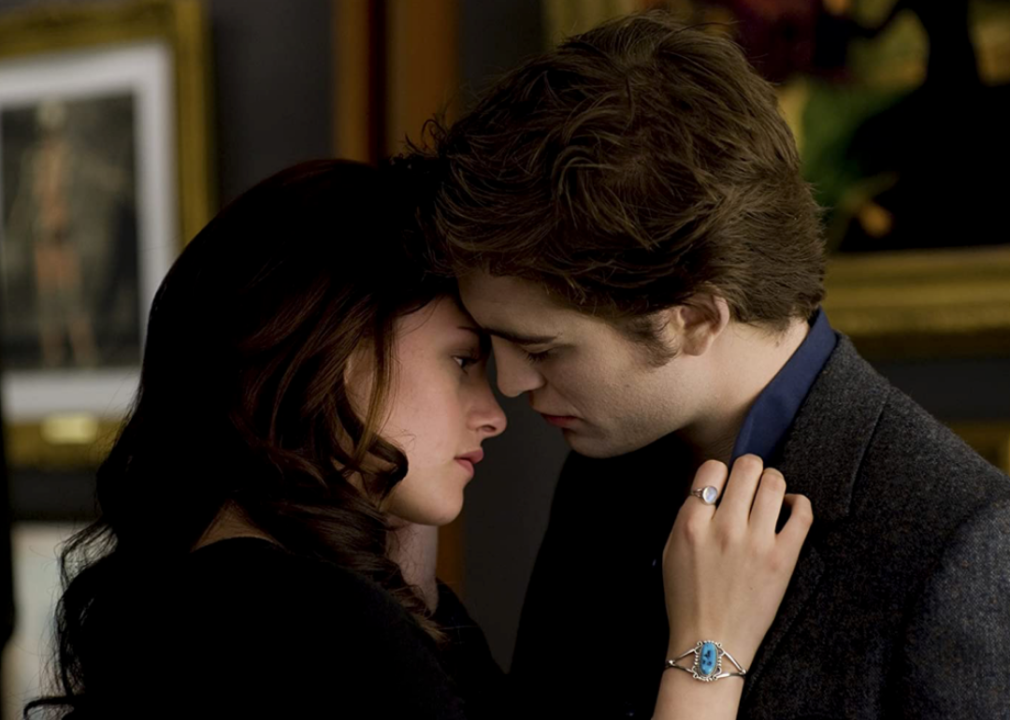
Temple Hill Entertainment
#22. Twilight
– Domestic box office (inflation-adjusted): $1,621,472,037
– Worldwide box office (non-inflation-adjusted): $3,317,470,739
– Years: 2008-2012
The vampire romance saga plays out over five films and stars pop culture icons Kristen Stewart and Robert Pattinson. It’s based on the Twilight series of books by Stephenie Meyer. “Twilight,” the first film of the franchise, made $35.7 million on its first day, which greenlit the sequel and the rest of the series.
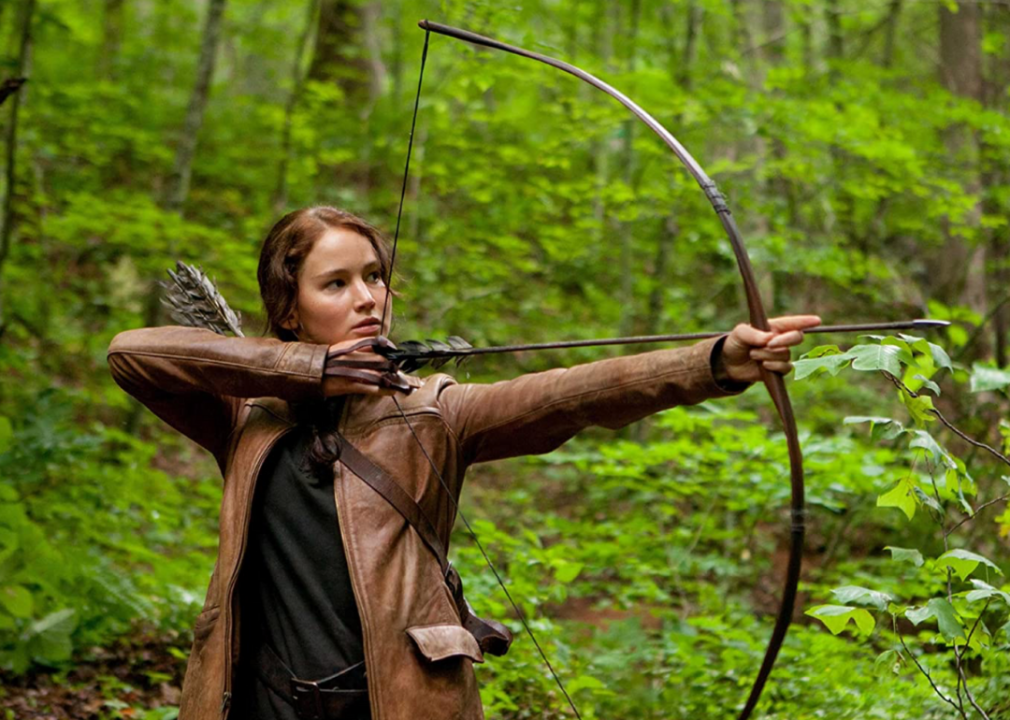
Lionsgate
#21. The Hunger Games
– Domestic box office (inflation-adjusted): $1,633,110,334
– Worldwide box office (non-inflation-adjusted): $2,958,353,344
– Years: 2012-2015
The dystopian future chronicled in author Suzanne Collins’ trilogy of young adult novels plays out on the big screen over four movies. The series features an ensemble cast featuring Jennifer Lawrence, Josh Hutcherson, Liam Hemsworth, Woody Harrelson, Elizabeth Banks, Stanley Tucci, and Donald Sutherland. “The Hunger Games” kicked off the series’ box office success, setting a record for the biggest opening day and opening weekend for a nonsequel film.
You may also like: The strange and beautiful worlds of Tim Burton movies

Universal Pictures
#20. Jaws
– Domestic box office (inflation-adjusted): $1,726,224,524
– Worldwide box office (non-inflation-adjusted): $737,573,891
– Years: 1975-1987
The original film “Jaws,” based on a novel by Peter Benchley and directed by Steven Spielberg, was a smash hit, earning $260 million at the box office, becoming the first summer blockbuster. The sequels, which follow the man-eating great white shark as it attacks groups of people in various parts of the world, seemed to get worse with each addition. The last two, in particular, had none of the original cast or crew members involved, and feel much more gimmicky and poorly edited.
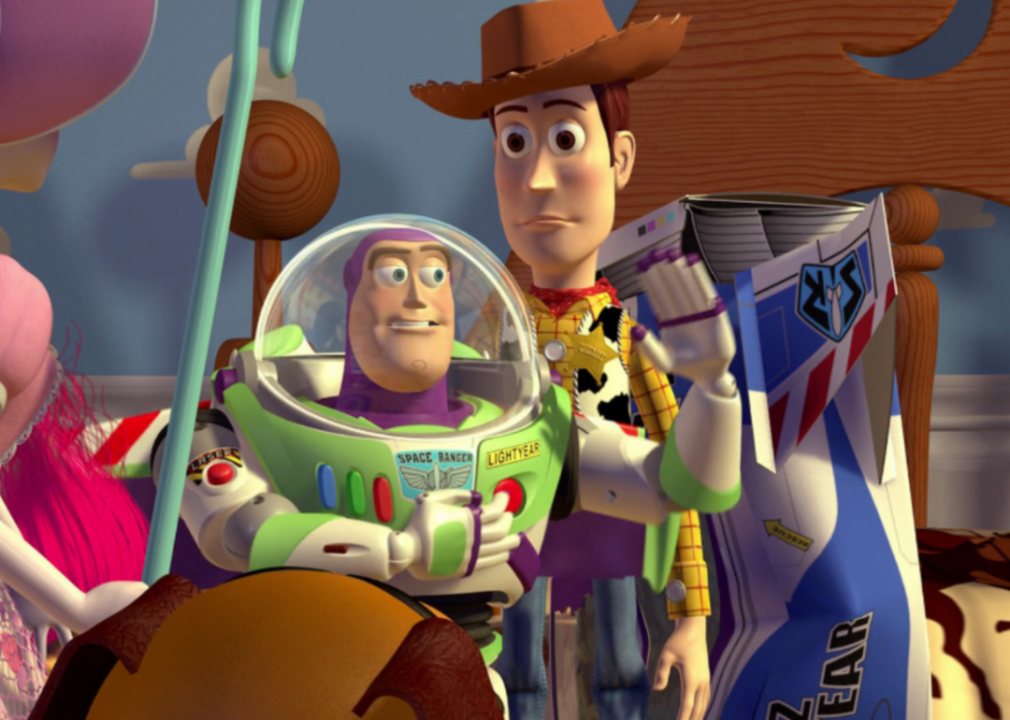
Walt Disney Pictures
#19. Toy Story
– Domestic box office (inflation-adjusted): $1,797,828,917
– Worldwide box office (non-inflation-adjusted): $3,054,457,147
– Years: 1995-present
The computer-animated film series operates under the belief that all toys are secretly alive. Toy Story is one of the most critically acclaimed animated franchises to date, having garnered numerous Academy Award nominations, including a Special Achievement Academy Award for “Toy Story,” and Best Animated Feature and Best Original Song awards for “Toy Story 3.”
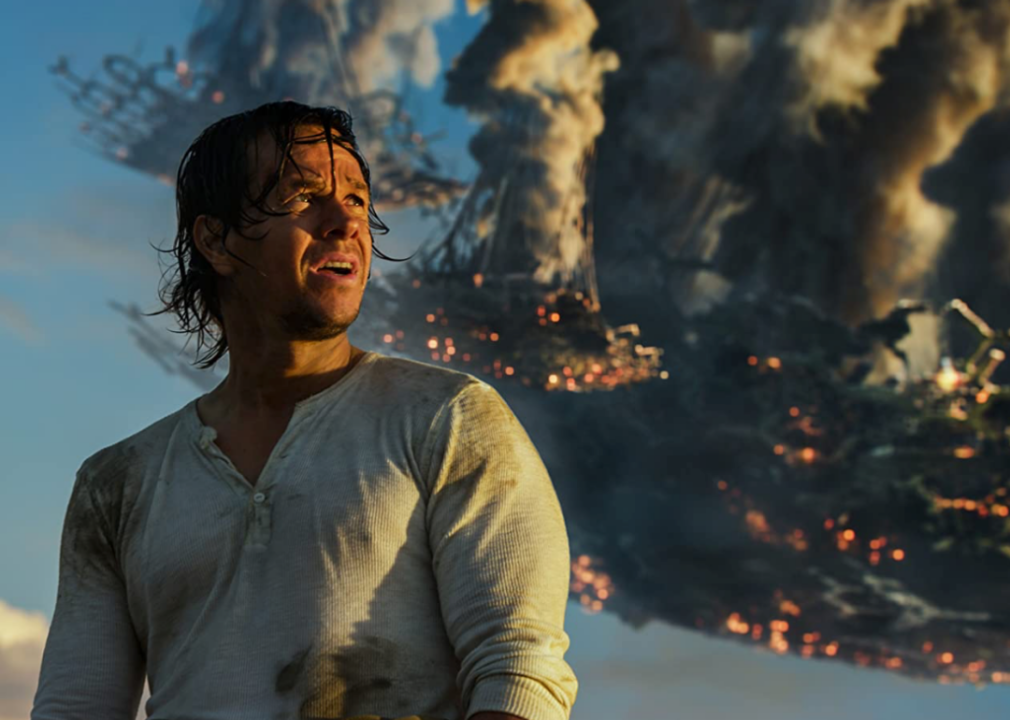
Paramount Pictures
#18. Transformers
– Domestic box office (inflation-adjusted): $1,875,385,925
– Worldwide box office (non-inflation-adjusted): $4,846,579,018
– Years: 1986-present
The sci-fi action movie series is based on the eponymous shape-shifting toys made by Hasbro in the 1980s and “The Transformers: The Movie,” an animated film released in 1986. Michael Bay directed all five live-action movies in the series, with Travis Knight helming the “Bumblebee” spin-off in 2018. Despite critical reviews, the franchise has received numerous Oscar nominations in the sound and visual effects categories.
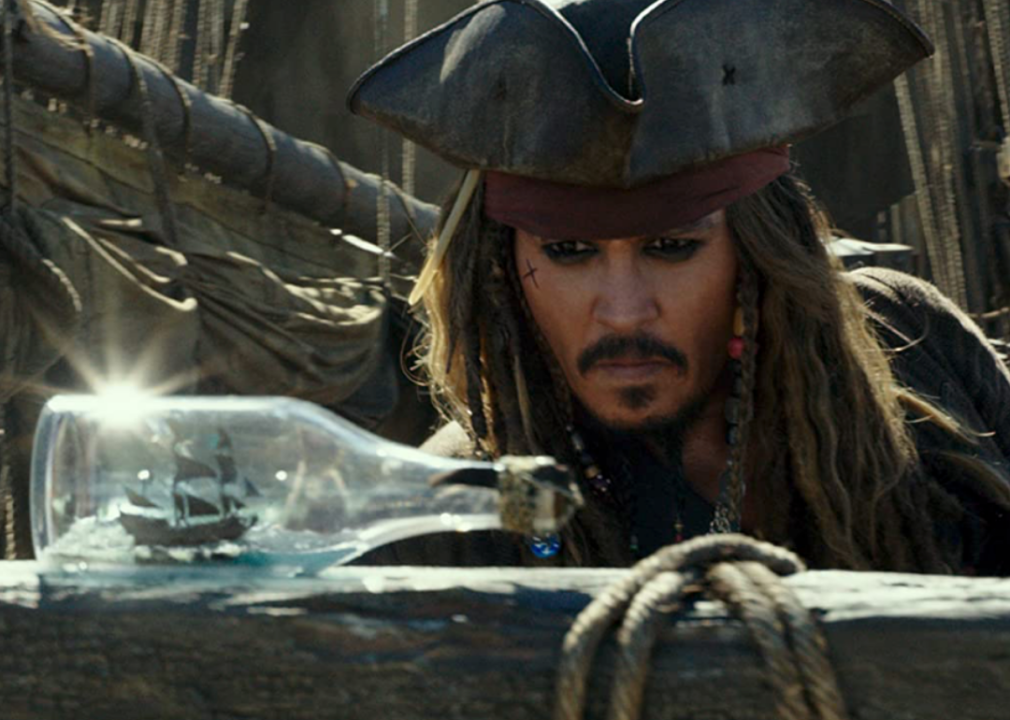
Disney Enterprises Inc.
#17. Pirates of the Caribbean
– Domestic box office (inflation-adjusted): $1,924,674,180
– Worldwide box office (non-inflation-adjusted): $4,522,062,632
– Years: 2003-2017
The Walt Disney fantasy film series is based on its namesake theme park ride. It stars Johnny Depp and Geoffrey Rush in their roles throughout the series and also features other well-known stars including Keira Knightley and Orlando Bloom. It was the first franchise where more than one film grossed $1 billion worldwide.
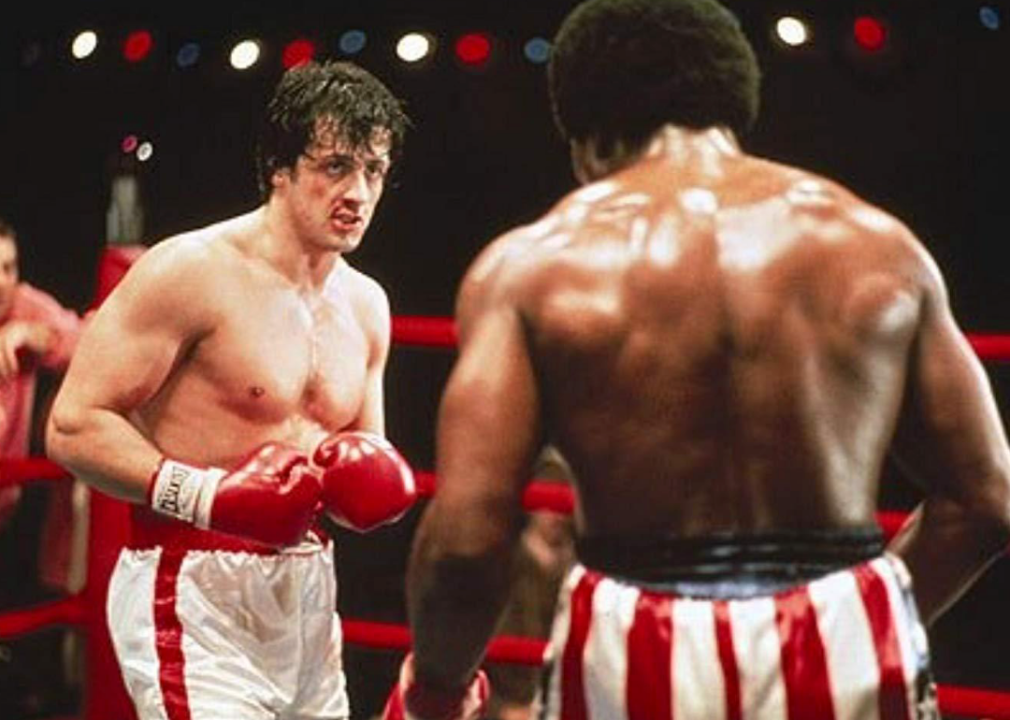
Metro-Goldwyn-Mayer (MGM)
#16. Rocky
– Domestic box office (inflation-adjusted): $1,954,460,898
– Worldwide box office (non-inflation-adjusted): $1,513,943,877
– Years: 1976-present
The first five movies in this sports drama series center around boxer Rocky Balboa played by Sylvester Stallone. “Rocky” was Stallone’s breakout role and went on to be the highest-grossing picture of 1976. The film is reportedly based on experiences from Stallone’s own life.
You may also like: Steven Spielberg films ranked from worst to first
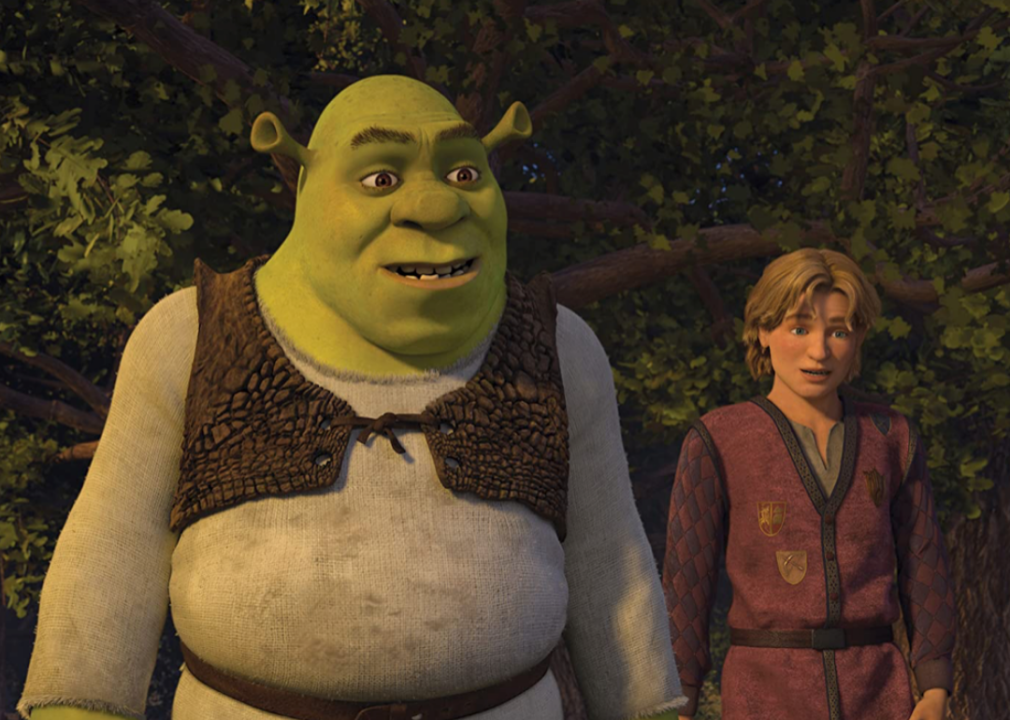
Dreamworks
#15. Shrek
– Domestic box office (inflation-adjusted): $1,965,364,789
– Worldwide box office (non-inflation-adjusted): $3,545,629,858
– Years: 2001-present
This DreamWorks Animation series is based on a picture book by William Steig. “Shrek 2” was far and away the franchise’s most successful. There have been numerous sequels and spin-offs to come from the franchise, including 2022’s “Puss in Boots: The Last Wish.”
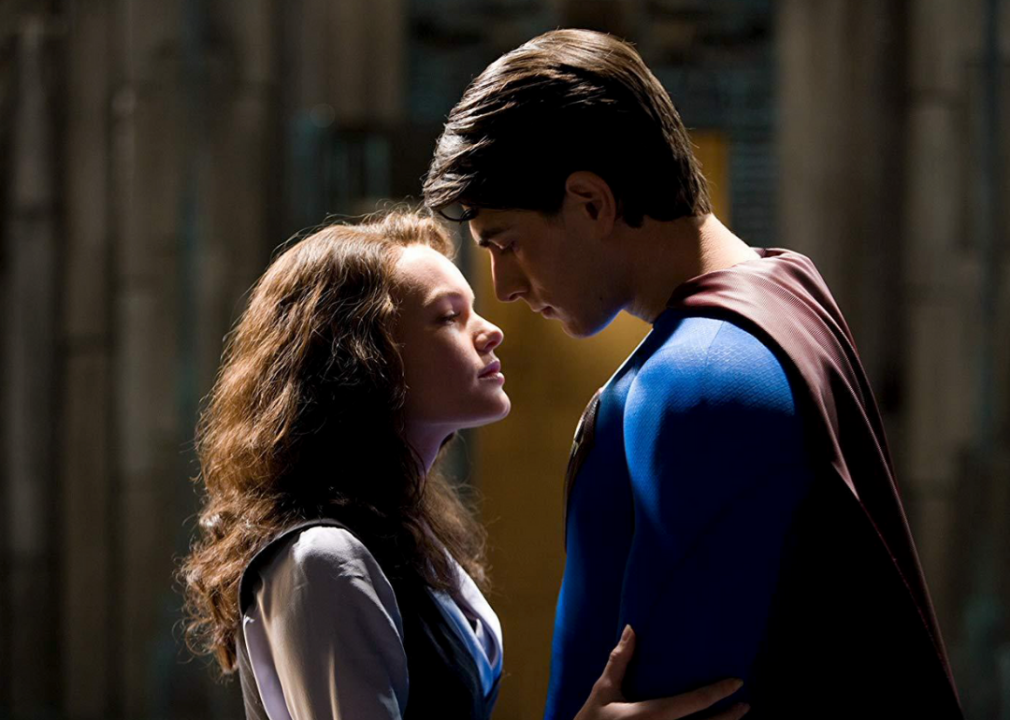
Warner Bros.
#14. Superman
– Domestic box office (inflation-adjusted): $2,064,265,047
– Worldwide box office (non-inflation-adjusted): $2,553,272,239
– Years: 1978-present
The most popular character in the DC Comics universe comes alive on the big screen in this film franchise. The most successful installment of the franchise is “Batman v Superman: Dawn of Justice.” When it opened in 2016, it was the largest domestic opening for Warner Bros. ever.
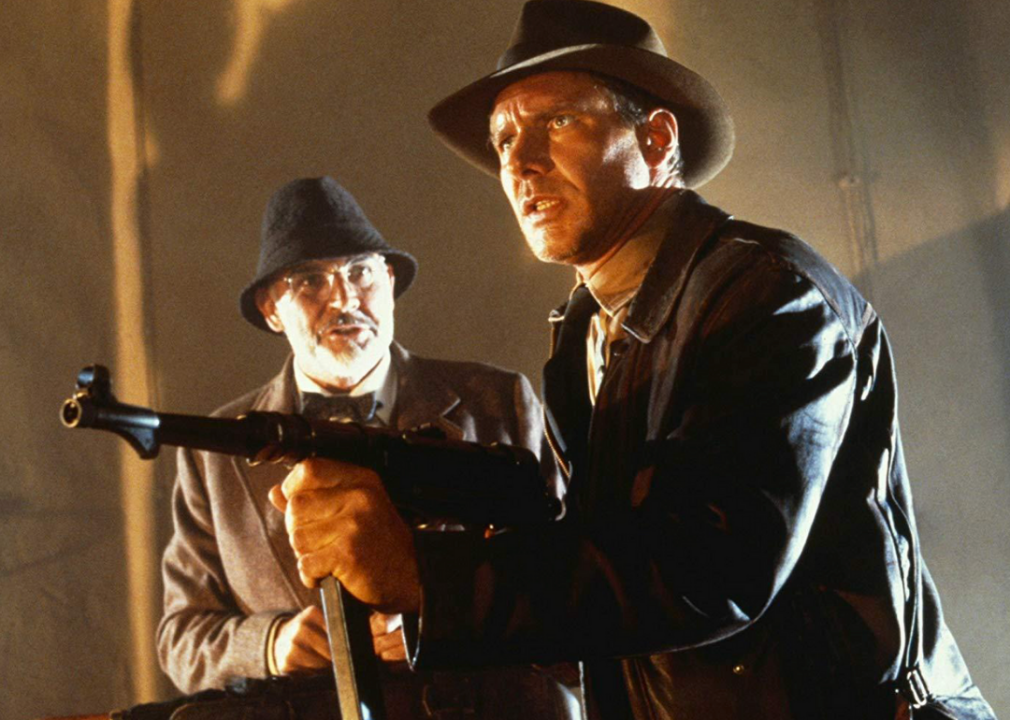
Paramount Pictures
#13. Indiana Jones
– Domestic box office (inflation-adjusted): $2,077,072,977
– Worldwide box office (non-inflation-adjusted): $1,961,339,569
– Years: 1981-present
This series follows archaeologist and hero Indiana Jones on adventures around the world. The franchise solidified Harrison Ford as both a leading man and action hero as he performed many of his own stunts. The American Film Institute ranked him as the second-greatest film hero of all time.
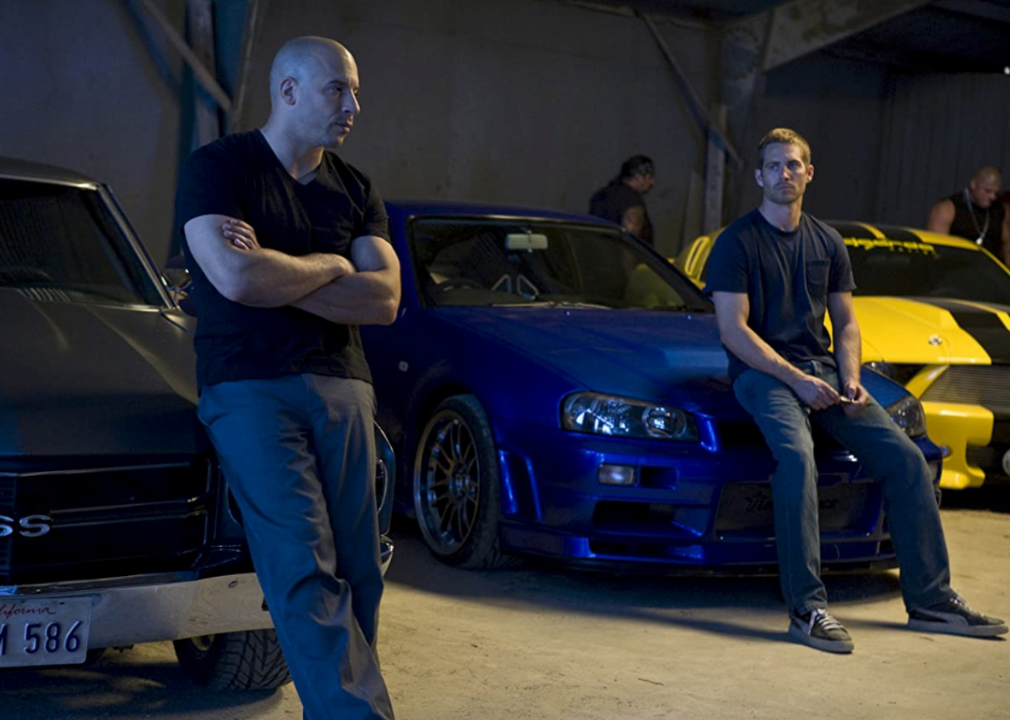
Universal Pictures
#12. Fast and the Furious
– Domestic box office (inflation-adjusted): $2,178,730,756
– Worldwide box office (non-inflation-adjusted): $6,614,519,888
– Years: 2001-present
This series about illegal street racing and heists is one of Universal Pictures’ biggest franchises of all time. Series star Paul Walker died in 2013 during the filming of “Furious 7,” which, as of January 2022, remains the most profitable movie of the franchise.
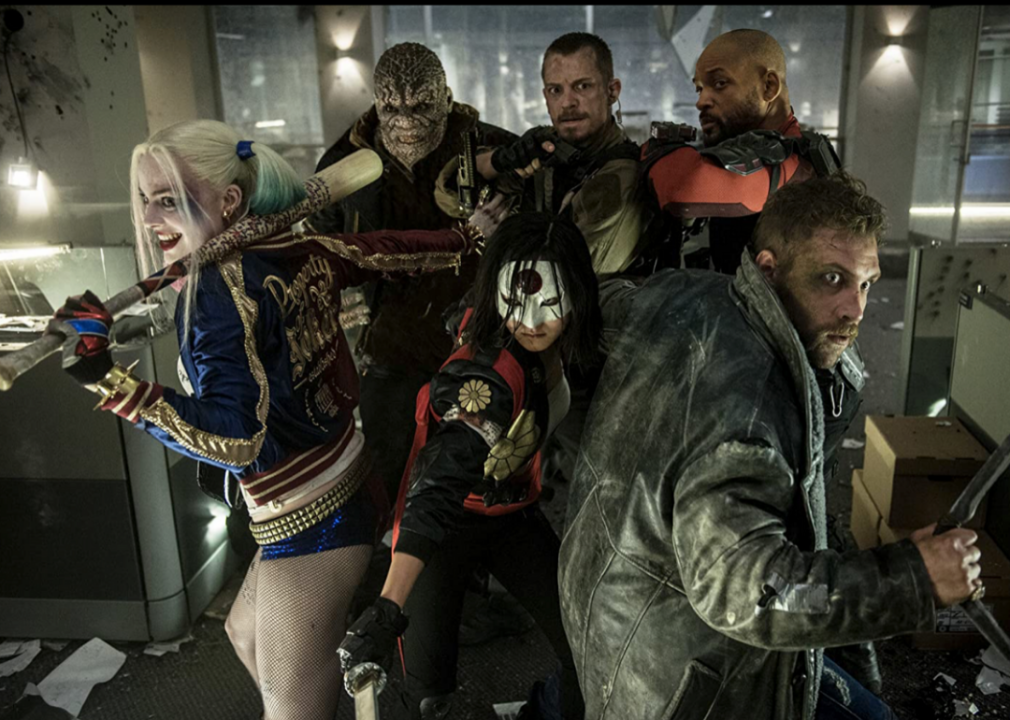
Warner Bros. Entertainment Inc.
#11. DC Extended Universe
– Domestic box office (inflation-adjusted): $2,342,801,454
– Worldwide box office (non-inflation-adjusted): $5,802,898,856
– Years: 2010-present
The DC Universe includes such superhero flicks as “Justice League,” “Man of Steel,” and “Suicide Squad.” “Wonder Woman,” the fourth movie in the franchise and most successful, is considered one of the best superhero films of all time. These box office figures represent only nine of the films in this franchise, with a plethora of projects in the works for die-hard fans.
You may also like: Best and worst Al Pacino movies
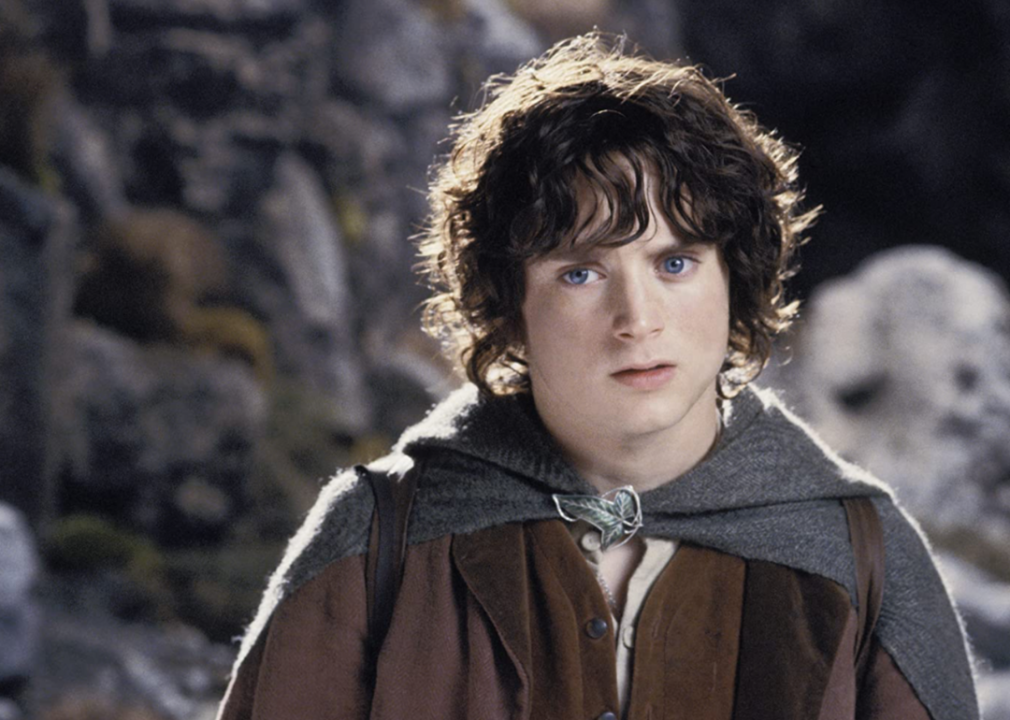
New Line Cinema
#10. Peter Jackson’s Middle Earth
– Domestic box office (inflation-adjusted): $2,536,933,292
– Worldwide box office (non-inflation-adjusted): $5,845,321,407
– Years: 2001-2014
The Middle Earth fantasy franchise includes all three of Peter Jackson’s “Lord of the Rings” movies and “The Hobbit” trilogy, based on the J.R.R. Tolkien novels. Although the reviews for “The Hobbit” weren’t as favorable as those for the “Lord of the Rings” trilogy, all three films outperformed the first two “Lord of the Rings” movies.
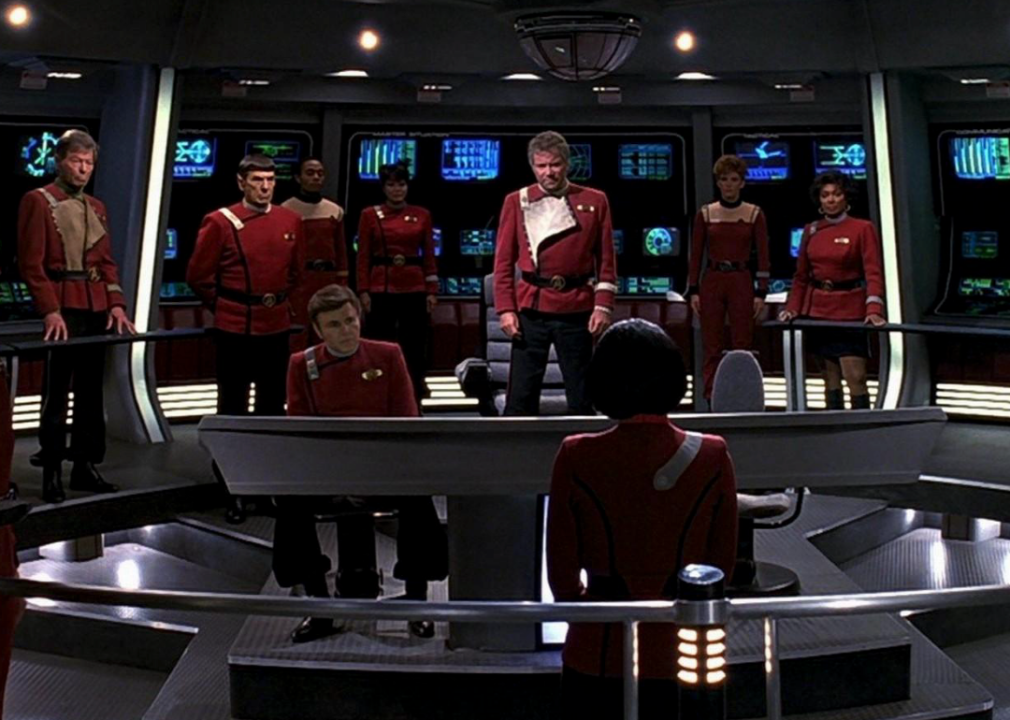
Paramount Pictures
#9. Star Trek
– Domestic box office (inflation-adjusted): $2,611,836,631
– Worldwide box office (non-inflation-adjusted): $2,266,907,732
– Years: 1979-2016
The Star Trek series spun off the television series that ran from 1966 to 1969 on NBC. Directed by J.J. Abrams and written by Roberto Orci and Alex Kurtzman, “Star Trek,” the 11th film to be released, was the first one in the rebooted series and remains the most successful film in the franchise.
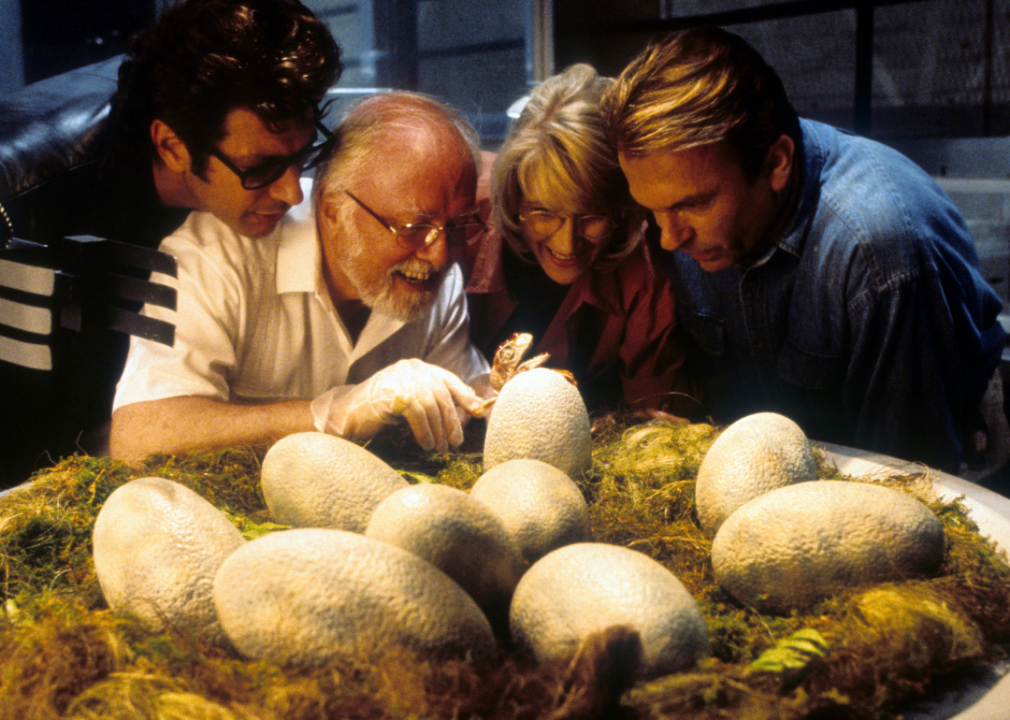
Universal // Getty Images
#8. Jurassic Park
– Domestic box office (inflation-adjusted): $2,723,602,562
– Worldwide box office (non-inflation-adjusted): $5,008,426,006
– Years: 1993-present
This American sci-fi action series, based on the eponymous novel by Michael Crichton, imagines what might happen if genetic scientists made it possible for dinosaurs to return to Earth and inhabit a theme park. Notable stars in the series include Jeff Goldblum, Laura Dern, Chris Pratt, and Bryce Dallas Howard. 2018’s “Jurassic World: Fallen Kingdom” will be followed by the series’ sixth film, “Jurassic World: Dominion,” in June 2022.
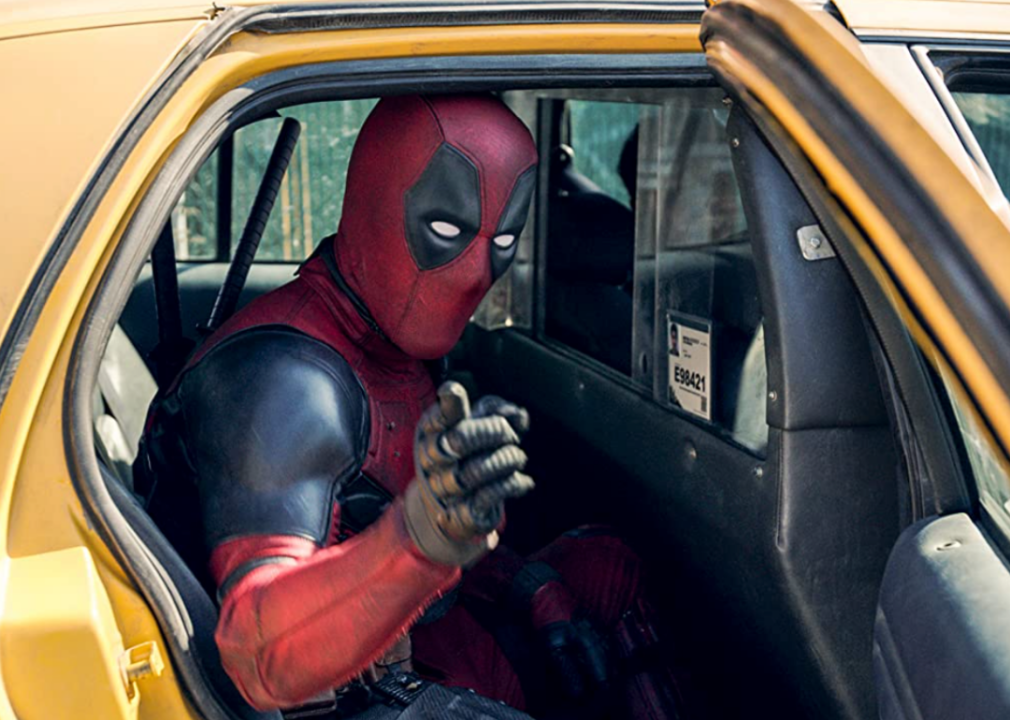
Twentieth Century Fox
#7. X-Men
– Domestic box office (inflation-adjusted): $2,921,416,378
– Worldwide box office (non-inflation-adjusted): $6,075,264,152
– Years: 2000-2020
The superhero series based in the Marvel Universe centers around a team of superheroes with mutant abilities. Before it appeared on the big screen, “X-Men” was a series of comic books created by Stan Lee and Jack Kirby. “Deadpool,” released in 2016, and “Deadpool 2,” released in 2018, will be followed by the production of “Deadpool 3.”
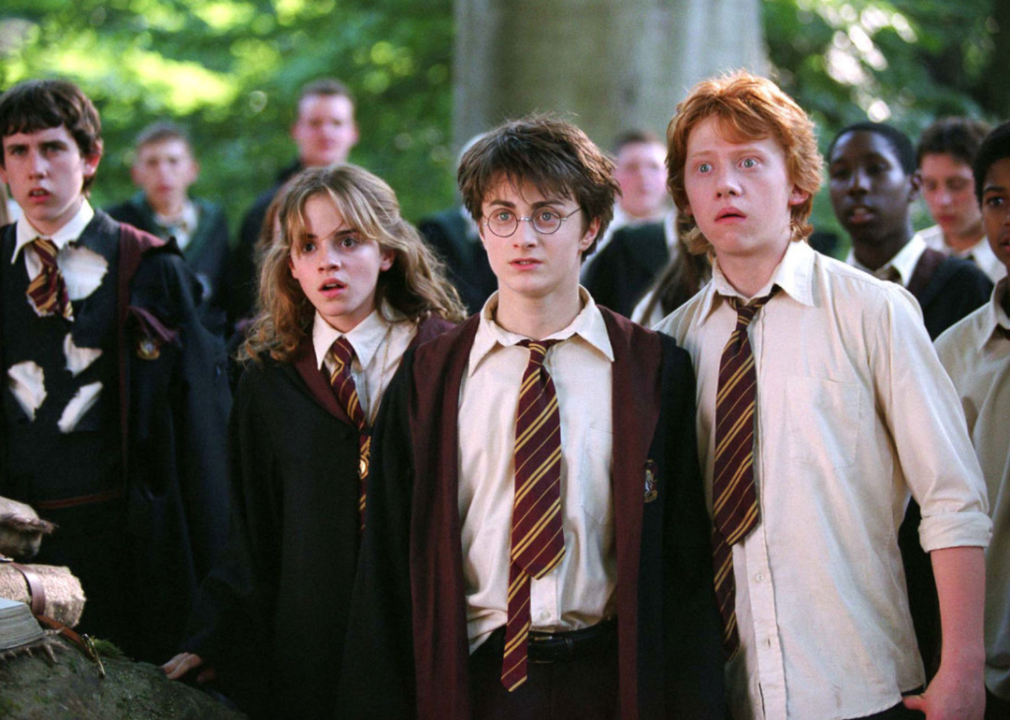
Warner Bros.
#6. Harry Potter
– Domestic box office (inflation-adjusted): $3,708,788,785
– Worldwide box office (non-inflation-adjusted): $9,394,626,564
– Years: 2001-present
J.K. Rowling published “Harry Potter and the Sorcerer’s Stone” more than 20 years ago, and little did she know that the book would not only change children’s book publishing but it would spawn one of the most successful film franchises ever. The movies released to date in J.K. Rowling’s Wizarding World franchise saw obsessed fans lined up in full Potter regalia to see the stories of their favorite magical characters come alive on the big screen.
You may also like: 50 of the best films according to women critics
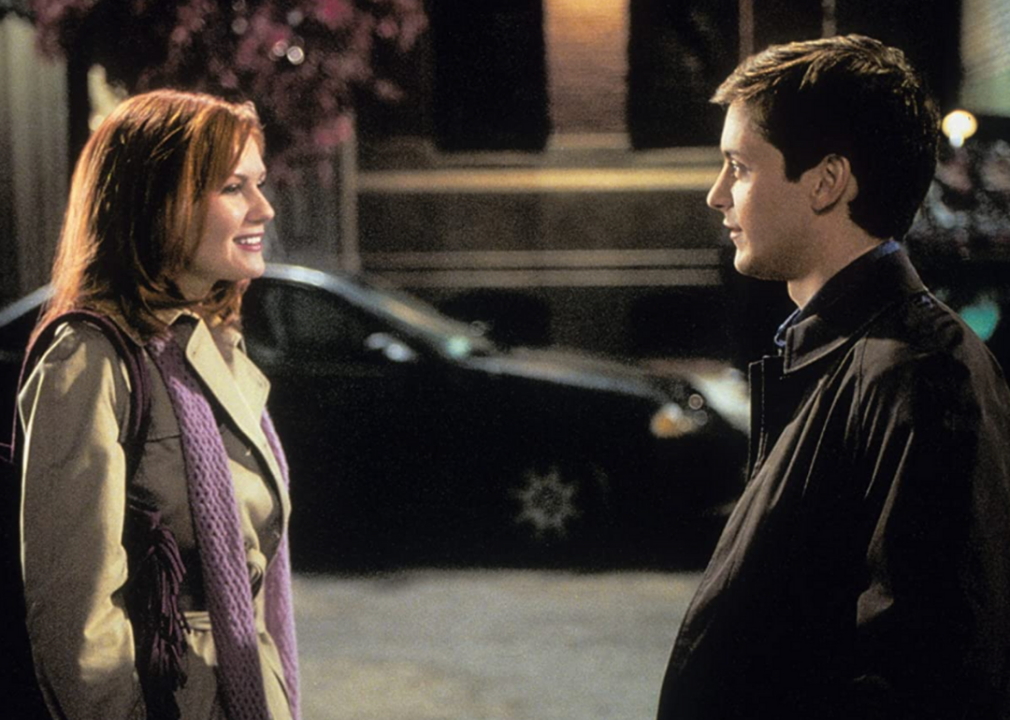
Columbia Pictures/Marvel Entertainment
#5. Spider-Man
– Domestic box office (inflation-adjusted): $3,901,208,586
– Worldwide box office (non-inflation-adjusted): $8,259,391,476
– Years: 2002-present
The web-slinging superhero of the Marvel Universe is also one of its most popular and successful to date. The protagonist in the franchise is based on the comic book character created by Stan Lee and Steve Ditko. Prominent stars in the franchise include Tobey Maguire, Tom Holland, Andrew Garfield, J.K. Simmons, Zendaya, Emma Stone, and Denis Leary.
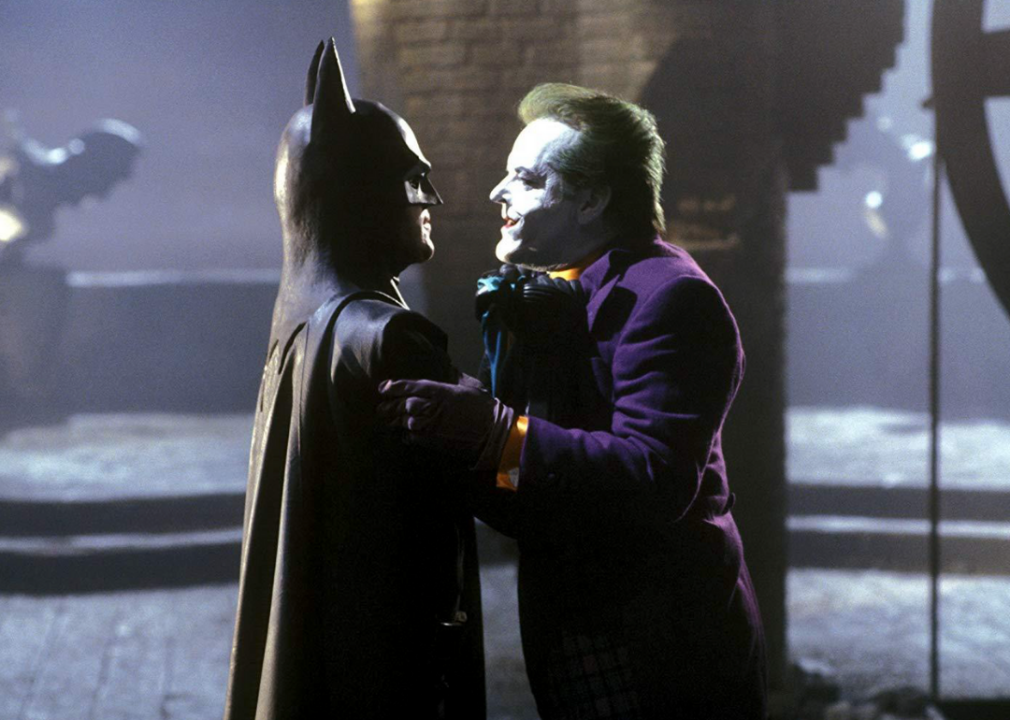
Warner Bros.
#4. Batman
– Domestic box office (inflation-adjusted): $4,336,811,413
– Worldwide box office (non-inflation-adjusted): $6,792,356,315
– Years: 1966-present
The Caped Crusader has had many incarnations over his multi-decade reign on the big screen. Batman is one of the most prominent characters in the DC Universe, originally created by artist Bob Kane and writer Bill Finger. Batman is also one of the most successful film franchises to date with 2008’s “The Dark Knight” not only being one of the most successful at the box office but also one of the best superhero movies ever made.
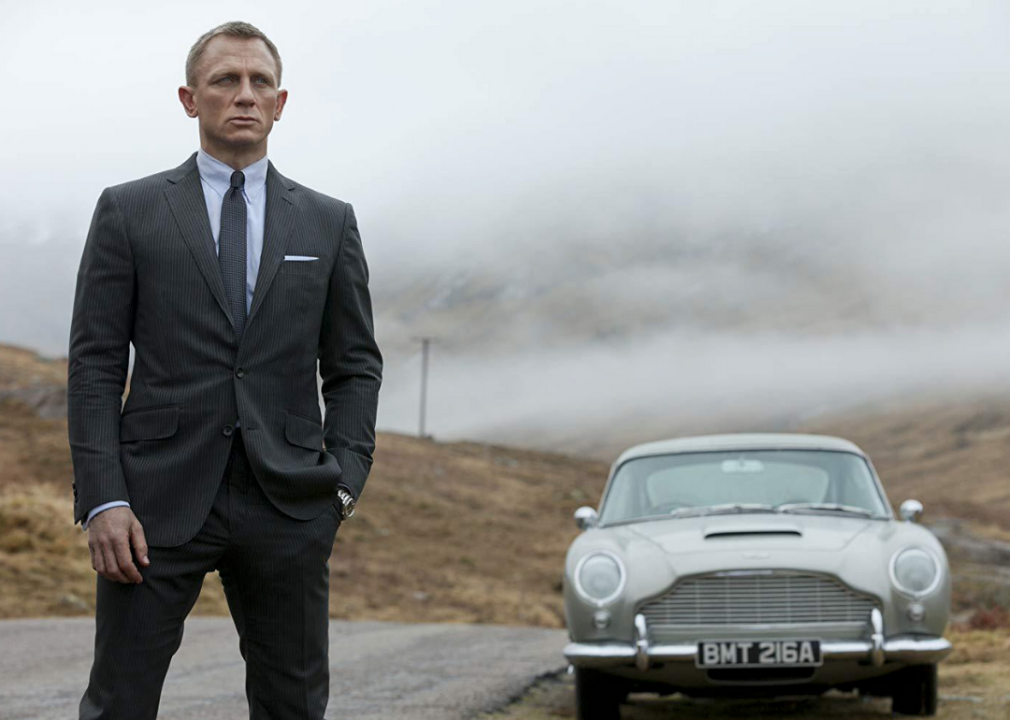
Metro-Goldwyn-Mayer (MGM)
#3. James Bond
– Domestic box office (inflation-adjusted): $6,131,090,501
– Worldwide box office (non-inflation-adjusted): $7,881,786,644
– Years: 1963-present
The epic spy franchise is based on the series of novels by Ian Fleming. The story centers around the secret agent James Bond, a character who has been played by seven different actors over the years. The successful franchise released its most recent film, “No Time to Die,” starring Daniel Craig in his final act as Bond, in October 2021.
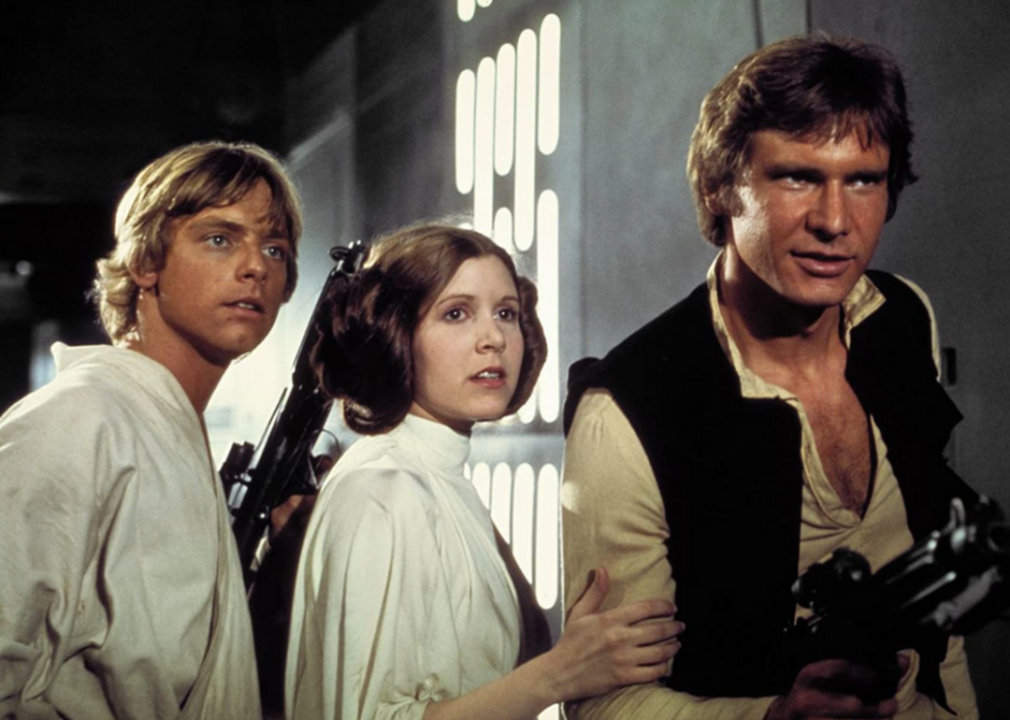
Lucasfilm Ltd.
#2. Star Wars
– Domestic box office (inflation-adjusted): $8,090,988,804
– Worldwide box office (non-inflation-adjusted): $10,318,326,428
– Years: 1977-present
With legacy “Star Wars” films combined with the small but mightily performing “Star Wars Anthology” movies, it’s no wonder the titles in the franchise make it one of the most successful of all time. “Star Wars: The Force Awakens” brought back stars Harrison Ford and the late Carrie Fisher to join up-and-comers Adam Driver, Daisy Ridley, and John Boyega.
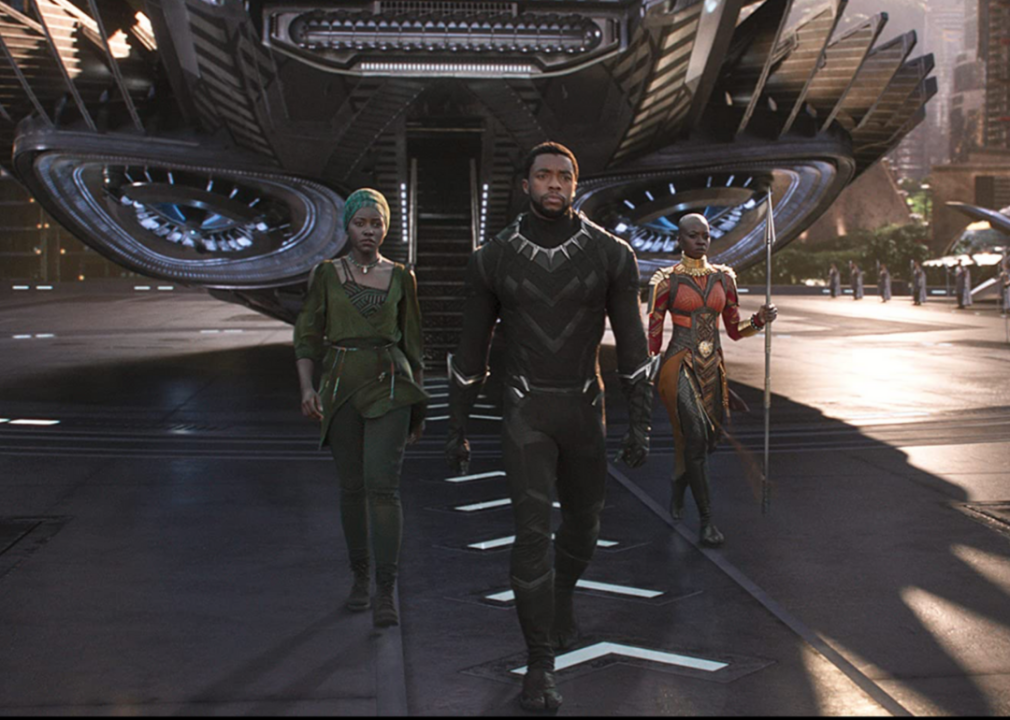
Disney/Marvel Studios
#1. Marvel Cinematic Universe
– Domestic box office (inflation-adjusted): $10,531,554,997
– Worldwide box office (non-inflation-adjusted): $25,665,480,214
– Years: 2008-present
The Marvel Cinematic Universe franchise averages more than two films per year and reigns supreme as the highest-grossing movie franchise in the history of the U.S. box office. Two of Marvel’s highest-grossing films include “Avengers: End Game,” at more than $858 million, and “Black Panther,” with more than $700 million at the domestic box office.
You may also like: How are women portrayed in top-grossing movies?
